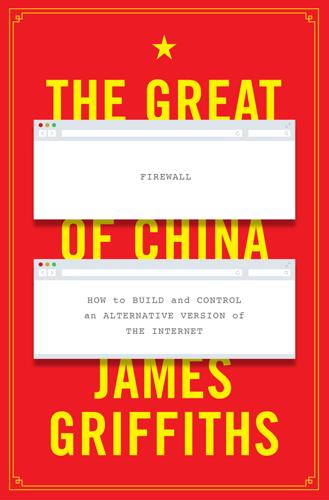
The Great Firewall of China
by
James Griffiths;
Published 15 Jan 2018
Walton, China’s Golden Shield: corporations and the development of surveillance technology in the People’s Republic of China, Montreal: International Centre for Human Rights and Democratic Development, 2001, https://web.archive.org/web/20020206170828/http://www.ichrdd.ca/english/commdoc/publications/globalization/goldenShieldEng.html 20J. Goldsmith and T. Wu, Who Controls the Internet?: Illusions of a borderless world, New York NY: Oxford University Press, 2006, p. 93. 21Author interview with Michael Robinson, January 2018. 22D. Sheff, ‘Betting on bandwidth’, Wired, 1 February 2002, https://www.wired.com/2001/02/tian/ 23Evolution of Internet in China, China Education and Research Network, 2001, https://web.archive.org/web/20061125232222/http://www.edu.cn/introduction_1378/20060323/t20060323_4285.shtml 24Sheff, ‘Betting on bandwidth’.
…
Farley, ‘China is abuzz over openness’, Los Angeles Times, 30 June 1998, http://articles.latimes.com/1998/jun/30/news/mn-65084 16‘Wei Jingsheng released’, Human Rights Watch, 16 November 1997, https://www.hrw.org/news/1997/11/16/wei-jingsheng-released 17‘UN treaty bodies and China’, Human Rights in China, https://www.hrichina.org/en/un-treaty-bodies-and-china 18J. Goldsmith and T. Wu, Who Controls the Internet?: Illusions of a borderless world, New York NY: Oxford University Press, 2006, pp. 90–1. 19‘China dissidents add branches to banned opposition party’, Los Angeles Times, 5 February 1999, http://articles.latimes.com/1999/feb/05/news/mn-5115 20Chase and Mulvenon, You’ve Got Dissent!, p. 12. 21P. Pan, ‘Wang Youcai arrives in Rhode Island after stop in San Francisco’, The Washington Post, 5 March 2004, https://www.sfgate.com/politics/article/China-frees-Tiananmen-dissident-Wang-Youcai-2814286.php 22China: nipped in the bud.
…
China’, Yahoo Press Room, 24 September 1999, https://web.archive.org/web/20080331032042/http://yhoo.client.shareholder.com:80/press/ReleaseDetail.cfm?ReleaseID=173569 14‘China’s internet industry wants self-discipline’, People’s Daily, 27 March 2002, http://en.people.cn/200203/26/eng20020326_92885.shtml 15J. Goldsmith and T. Wu, Who Controls the Internet?: Illusions of a borderless world, New York NY: Oxford University Press, 2006, p. 9. 16‘Public pledge of self-regulation and professional ethics for China internet industry’, Internet Society of China, 9 August 2011, http://www.isc.org.cn/english/Specails/Self-regulation/listinfo-15321.html 17Goldsmith and Wu, Who Controls the Internet?
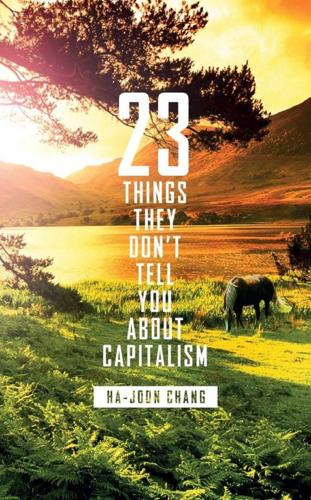
23 Things They Don't Tell You About Capitalism
by
Ha-Joon Chang
Published 1 Jan 2010
Thing 4 The washing machine has changed the world more than the internet has What they tell you The recent revolution in communications technologies, represented by the internet, has fundamentally changed the way in which the world works. It has led to the ‘death of distance’. In the ‘borderless world’ thus created, old conventions about national economic interests and the role of national governments are invalid. This technological revolution defines the age we live in. Unless countries (or companies or, for that matter, individuals) change at corresponding speeds, they will be wiped out.
…
I am not saying that those things are necessarily more important, but many donors have rushed into fancy programmes without carefully assessing the relative long-term costs and benefits of alternative uses of their money. In yet another example, a fascination with the new has led people to believe that the recent changes in the technologies of communications and transportation are so revolutionary that now we live in a ‘borderless world’, as the title of the famous book by Kenichi Ohmae, the Japanese business guru, goes.6 As a result, in the last twenty years or so, many people have come to believe that whatever change is happening today is the result of monumental technological progress, going against which will be like trying to turn the clock back.
…
In short, few corporations are truly transnational. The vast majority of them still produce the bulk of their outputs in their home countries. Especially in terms of high-grade activities such as strategic decision-making and higher-end R&D, they remain firmly centred at their home countries. The talk of a borderless world is highly exaggerated.1 Why is there a home-country bias? Why is there a home-country bias in this globalized world? The free-market view is that nationality of capital does not – and should not – matter, because companies have to maximize profit in order to survive and therefore that patriotism is a luxury they can ill afford.
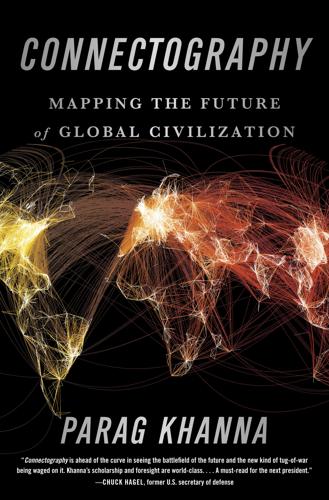
Connectography: Mapping the Future of Global Civilization
by
Parag Khanna
Published 18 Apr 2016
There are no greater stakes than in the question of moving from a nations-borders world to a flow-friction world. We need a more borderless world because we can’t afford destructive territorial conflict, because correcting the mismatch of people and resources can unlock incredible human and economic potential, because so few states provide sufficient welfare for their citizens, and because so many billions have yet to fully benefit from globalization. Borders are not the antidote to risk and uncertainty; more connections are. But if we want to enjoy the benefits of a borderless world, we have to build it first. Our fate hangs in the balance. RECOMMENDED SITES AND TOOLS FOR MAPPING AJD GEOSPATIAL CONCEPTS http://gisconsultingservices.com/ AJD Geospatial Concepts specializes in the organization, analysis, and mapping of geographic data for urban and regional planning; utility, environmental, infrastructure, and transportation management; business and political analysis; and 3-D topographic and flood analysis.
…
—Kevin Kelly, co-founder, Wired “Parag Khanna takes our knowledge of connectivity into virgin territory, providing an entire atlas on how old and new connections are reshaping our physical, social, and mental worlds. This is a deep and highly informative reflection on the meaning of a rapidly developing borderless world. Connectography proves why the past is no longer prologue to the future. There’s no better guide than Parag Khanna to show us all the possibilities of this new hyperconnected world.” —Mathew Burrows, director, Strategic Foresight Initiative at the Atlantic Council, and former counselor, U.S.
…
The Digital Identity Buffet Spreading the Connective Wealth The Global Digital Workforce CHAPTER 15 THE GREAT DILUTION A Mongrel Civilization BOX: China: Imperial Nation-State Global Passports Global Citizens Citizenship Arbitrage CHAPTER 16 WHEN NATURE HAS ITS SAY, GET OUT OF THE WAY Retreat from the Water’s Edge? BOX: Rivers over Borders How to Negotiate with Nature BOX: Measuring the Supply Chain’s Footprint Location, Location, Location CONCLUSION: FROM CONNECTIVITY TO RESILIENCE A New Moral Compass Networks That Run Themselves Building a Borderless World Recommended Sites and Tools for Mapping Map Insert Dedication Acknowledgments Notes Bibliography Map Credits and Sources By Parag Khanna About the Author PROLOGUE The natural consequence of any obsession is passing it on to one’s children. I’ve been collecting globes, maps, and other geographic artifacts since my itinerant childhood.
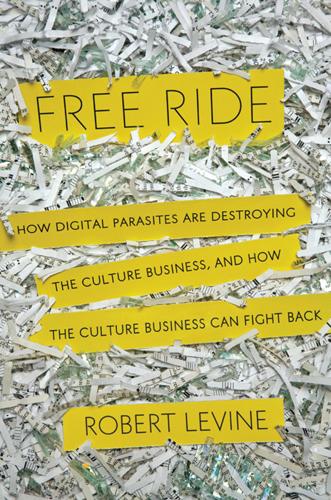
Free Ride
by
Robert Levine
Published 25 Oct 2011
And like many technology companies before and since, it argued that it couldn’t exert any control over the Internet, in this case to block French users from its site. At the time, according to Jack Goldsmith and Tim Wu’s Who Controls the Internet? Illusions of a Borderless World, it seemed entirely possible that France would give in. Internet utopians claimed such censorship was impossible anyway. “It’s not that laws aren’t relevant,” the MIT Media Lab’s cofounder Nicholas Negroponte said at the time, “it’s that the nation-state is not relevant.”7 France, this line of thinking implied, would just have to accept the new reality of a borderless world. But France does not even fully accept the reality of Sunday shop openings. “It became clear,” Goldsmith and Wu write, “that the irrelevance of the nation-state would not go uncontested.”8 When Yahoo!
…
Thomas Crampton, “France Weighs Forcing iPods to Play Other Than iTunes,” New York Times, March 17, 2006. 6. Elisabeth Niggemann, Jacques de Decker, and Maurice Lévy, The Net Renaissance: Report of the “Comité des Sages” Reflection Group on Bringing Europe’s Cultural Heritage Online (European Commission, January 2011). 7. Jack Goldsmith and Tim Wu, Who Controls the Internet? Illusions of a Borderless World, p. 3. 8. Ibid. 9. David Hearst, “Yahoo! Faces French Fines for Nazi Auctions,” Guardian, July 24, 2000. 10. Goldsmith and Wu, Who Controls the Internet?, p. 7. 11. Lisa Guernsey, “Welcome to the Web. Passport, Please?” New York Times, March 15, 2001. 12. This idea was introduced during the 1993 negotiations for the General Agreement on Tariffs and Trade and allows France to protect its movie business with quotas. 13.
…
Book Business: Publishing Past, Present, and Future. New York: W. W. Norton, 2001. Fisher, William W., III. Promises to Keep: Technology, Law, and the Future of Entertainment. Stanford, Calif.: Stanford Law and Politics, 2004. Goldsmith, Jack, and Tim Wu. Who Controls the Internet? Illusions of a Borderless World. New York: Oxford University Press, 2006. A prescient look at the future of law online and a thoroughly researched rejoinder to anyone who thinks it won’t have one. Goldstein, Paul. Copyright’s Highway: From Gutenberg to the Celestial Jukebox. Stanford, Calif.: Stanford Law and Politics, 2003.
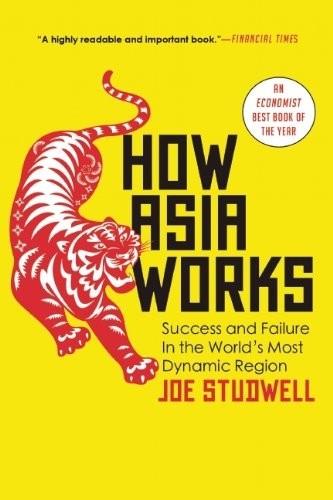
How Asia Works
by
Joe Studwell
Published 1 Jul 2013
Despite its being entirely at odds with the industrial policies that made Japan rich – policies which Mahathir was supposed to be imitating – the prime minister was so taken with Ohmae’s book The Borderless World that he ordered all around him to read it. Asmat Kamaludin, who became the top bureaucrat at Malaysia’s Ministry of International Trade and Industry in this period, recalls: ‘You felt safe if you were walking around with that book.’156 However, with the benefit of hindsight, the rather hasty, under-researched and breathless tone of The Borderless World was a pointer to the unlikelihood of its prediction that the world was becoming more favourable to the development of poor countries.
…
Unfortunately, he did not. Nor did Mahathir read Park Chung Hee’s books about development policy in Korea.145 Instead, he would later read – and tell his underlings to read – a fashionable, pro-globalisation book that was wholly irrelevant to his country’s needs: Kenichi Ohmae’s 1990 tome The Borderless World. Mahathir was mercurial. He launched his biggest industrialisation projects, and then began to sour on Japanese joint venture partners, even before Malaysian bureaucrats had completed a detailed Industrial Master Plan.146 Mahathir’s neglect of export discipline was his first error, and had effects that were quickly apparent.
…
In the 1990s, by contrast, Ohmae and Mahathir went on to plan and launch the futuristic and widely ridiculed Multimedia Super Corridor and Cyberjaya investment park projects around Kuala Lumpur. These were supposed to foster indigenous high technology through free market, win–win cross-border cooperation, but have done no such thing.157 Instead, the white elephant projects stand as testaments to the naivete – albeit well-meaning naivete – of books like The Borderless World and The World is Flat that suggest that we are moving towards a new developmental paradigm in which the interests of rich and poor nations neatly coincide. Journey 4: Across Malaysia Once again we need to take a drive. This being Malaysia, with a Gini coefficient of around 0.5, the car hire firm despatches a couple of peons to bring a vehicle to the house where I am staying on the west side of Kuala Lumpur.
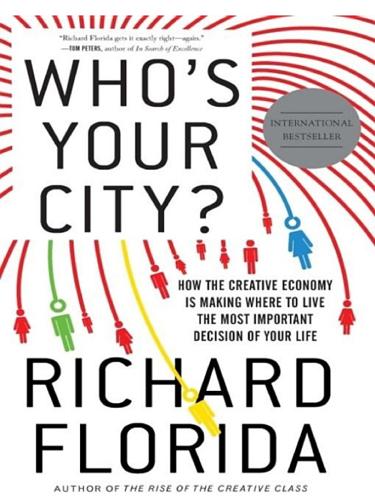
Who's Your City?: How the Creative Economy Is Making Where to Live the Most Important Decision of Your Life
by
Richard Florida
Published 28 Jun 2009
In 1993 the Japanese management expert Kenichi Ohmae wrote an influential Foreign Affairs article arguing that the globe’s natural economic zones, or “region states,” had replaced nation-states as the organizing economic units of what he famously dubbed the “borderless world.”4 Ohmae said, “Region states may lie entirely within or across the borders of a nation-state. This does not matter. It is the irrelevant result of historical accident. What defines them is not the location of their political borders but the fact that they are the right size and scale to be the true, natural business units in today’s global economy. Theirs are the borders—and connections—that matter in a borderless world.” But not all large urban areas qualify as economic megaregions. Many cities in the developing nations are immense but lack the economic clout of megaregions.
…
Beirut Bell, Daniel Benedict, Ruth Benson, Brendan Berlin(fig.) Bern Bernard, David Berry, Christopher Bers, Joanna Best Buy Beverly Hills Bhangra Big sort Birmingham, England Birmingham, Michigan Bishop, Bill BlackBerry BLS. See Bureau of Labor Statistics Bohemian-Gay Index Boho-burb Bollywood Bonding Borderless world Boston real estate in Bos-Wash corridor (fig.) Bourgeois-bohemian Bowling Alone (Putnam) Brazil BRIC nations See also Brazil; China; India; Russia Bridging Brisbane Brookings Institution Brooks, David Brownsville, Texas Brûlé, Tyler Buenos Aires Buffalo Bureau of Labor Statistics (BLS) Burtless, Gary Busan Business Week Cairncross, Frances Cairo(fig.)
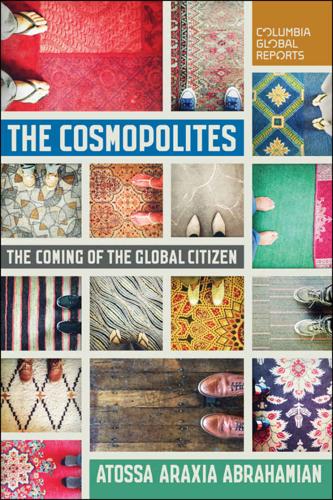
The Cosmopolites: The Coming of the Global Citizen
by
Atossa Araxia Abrahamian
Published 14 Jul 2015
What does citizenship become when it becomes detached from any kind of civic engagement and political identification—when it is a matter of convenience, not community? What are the stakes when members of a community no longer feel a particular kinship or loyalty to any particular place? What does it mean when the wealthy can move freely between countries and exploit the “borderless” world that globalization has promised, but that the poor who try to cross borders can’t—or, if they can, routinely die trying? Who among us gets to be “global”? I think the stories in this book begin to give an answer. Prologue On October 10, 2008, eleven officials from the Comoro Islands made their way from their respective villages to a spare one-terminal airport not far from the capital, where, on a runway overlooking the Indian Ocean, a private plane stood waiting to fly them to Kuwait.
…
(Here, the techies inadvertently channel Karl Marx, who long before they were born argued that technological improvements bring about socio-economic change.) This argument, as Harvard law professor Jack Goldsmith and Columbia law professor Tim Wu say in the 2006 book Who Controls the Internet: Illusions of a Borderless World, rests on faulty assumptions. Rather than indulging the Internet’s laissez-faire tendencies, nation-states have not only developed the Internet but powerfully encroached upon cyberspace, using national law, technological innovations such as firewalls and filters, and financial regulation to impose border-style controls and prevent their citizens from straying too far.
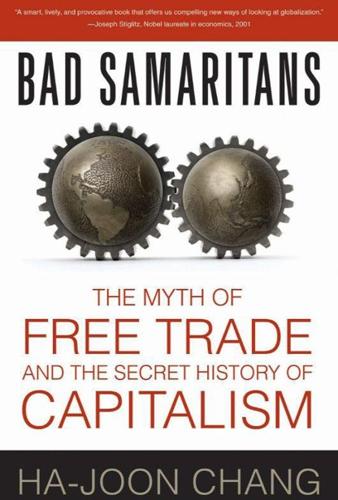
Bad Samaritans: The Myth of Free Trade and the Secret History of Capitalism
by
Ha-Joon Chang
Published 26 Dec 2007
Sometimes the regulation was draconian – Finland, Japan, Korea and the USA (in certain sectors) are the best examples. There were countries that succeeded by actively courting FDI, such as Singapore and Ireland, but even they did not adopt the laissez-faire approach towards TNCs that is recommended to the developing countries today by the Bad Samaritans. Borderless world? Economic theory, history and contemporary experiences all tell us that, in order truly to benefit from foreign direct investment, the government needs to regulate it well. Despite all this, the Bad Samaritans have been trying their best to outlaw practically all regulation of foreign direct investment over the last decade or so.
…
Bilateral and regional free trade agreements (FTAs) and bilateral investment treaties (BITs) between rich and poor countries also restrict the ability of developing countries to regulate FDI.53 Forget history, say the Bad Samaritans in defending such actions. Even if it did have some merits in the past, they argue, regulation of foreign investment has become unnecessary and futile, thanks to globalization, which has created a new ‘borderless world’. They argue that the ‘death of distance’ due to developments in communications and transportation technologies has made firms more and more mobile and thus stateless – they are not attached to their home countries any more. If firms do not have nationality any more, it is argued, there are no grounds for discriminating against foreign firms.
…
While foreign direct investment is no Mother Teresa, it often does bring benefits to the host country in the short run. But it is the long run that counts when it comes to economic development. Accepting FDI unconditionally may actually make economic development in the long run more difficult. Despite the hyperbole about a ‘borderless world’, TNCs remain national firms with international operations and, therefore, are unlikely to let their subsidiaries engage in higher-level activities; at the same time their presence can prevent the emergence of national firms that might start them in the long run. This situation is likely to damage the long-run development potential of the host country.
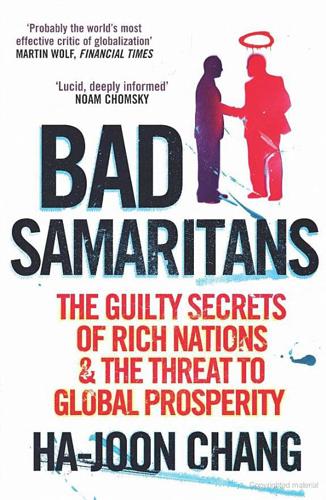
Bad Samaritans: The Guilty Secrets of Rich Nations and the Threat to Global Prosperity
by
Ha-Joon Chang
Published 4 Jul 2007
Sometimes the regulation was draconian – Finland, Japan, Korea and the USA (in certain sectors) are the best examples. There were countries that succeeded by actively courting FDI, such as Singapore and Ireland, but even they did not adopt the laissez-faire approach towards TNCs that is recommended to the developing countries today by the Bad Samaritans. Borderless world? Economic theory, history and contemporary experiences all tell us that, in order truly to benefit from foreign direct investment, the government needs to regulate it well. Despite all this, the Bad Samaritans have been trying their best to outlaw practically all regulation of foreign direct investment over the last decade or so.
…
Bilateral and regional free trade agreements (FTAs) and bilateral investment treaties (BITs) between rich and poor countries also restrict the ability of developing countries to regulate FDI.53 Forget history, say the Bad Samaritans in defending such actions. Even if it did have some merits in the past, they argue, regulation of foreign investment has become unnecessary and futile, thanks to globalization, which has created a new ‘borderless world’. They argue that the ‘death of distance’ due to developments in communications and transportation technologies has made firms more and more mobile and thus stateless – they are not attached to their home countries any more. If firms do not have nationality any more, it is argued, there are no grounds for discriminating against foreign firms.
…
While foreign direct investment is no Mother Teresa, it often does bring benefits to the host country in the short run. But it is the long run that counts when it comes to economic development. Accepting FDI unconditionally may actually make economic development in the long run more difficult. Despite the hyperbole about a ‘borderless world’, TNCs remain national firms with international operations and, therefore, are unlikely to let their subsidiaries engage in higher-level activities; at the same time their presence can prevent the emergence of national firms that might start them in the long run. This situation is likely to damage the long-run development potential of the host country.
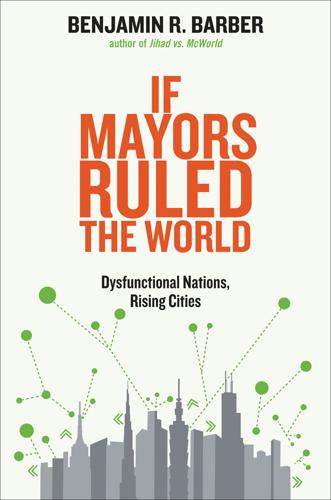
If Mayors Ruled the World: Dysfunctional Nations, Rising Cities
by
Benjamin R. Barber
Published 5 Nov 2013
The sentimental story told in the classic film It’s a Wonderful Life, in which the small-time community banker played by Jimmy Stewart prevails over the ambitious bigbank rival who tries to destroy him, contains a nugget of truth about the relationship between banking and a democratic community. Embedded in these critical economic issues is a tension between old theories and new realities. The new realities are about interdependence. For decades thinkers such as Masao Miyoshi have been announcing the coming of a “borderless world.”25 But the old theory insists on the sovereign independence of bordered states that, lacking a global compass, allow banks and oil cartels (and pandemics and climate change) to dominate the world. The institutions that precipitate today’s crises are cross-border, but the states tasked to address the crises remain trapped within their frontiers.
…
Barcelona in Catalonia (Spain) is among the most visionary cities, the home not only of the IAAC, but of the new City Protocol project described in Chapters 5, 9, and 12. See IAAC (Barcelona), Third Advanced Architectural Contest: Self Sufficient City (Envisioning the Habitat of the Future), 2010. 25. Masao Miyoshi, “A Borderless World? From Colonialism to Transnationalism and the Decline of the Nation State,” Critical Inquiry, Vol. 19, No. 4 (Summer 1993), pp. 726–751. 26. David A. Wylie, City, Save Thyself! Boston: Trueblood Publishing, 2009, p. 131. 27. Ibid., p. 201. 28. Bill Clinton’s Democratic Convention Speech, September 5, 2012, http://abcnews.go.com/Politics/OTUS/transcript-bill-clintons-democratic-convention-speech/story?
…
See Culture Asian networks, 120 Asia-Pacific Summit of Women Mayors and Councilors, 120 Association of Performing Arts Presenters (APAP), 290, 293 Athens, Greece, 88–89 “Audioments,” 282, 341 Austrian cultural office, 291–292 Autarky, 40, 63–64, 321–325 Autonomy, 166–171, 321–325, 328–332 Axelrod, David, 83, 92 Ayrault, Jean-Marc, 94 Baile, David, 289–290 Bailouts, 186–187 Balmori, Diana, 46 Baltimore financial crisis, 186, 379n32 Banfield, Edward C., 15, 37 Ban Ki-moon, 183 Bankruptcy, 186, 321, 323 Barcelona and City Protocol, 243–244 Barenboim, Daniel, 287 Bausch, Pina, 288 Beautiful Foundation, 333 Belafonte, Harry, 279, 288 Belo Horizonte participatory budgeting, 308 Benton Foundation, 255, 263 Berlin cultural areas, 278–279, 393n11 Besseres Hannover (Neo-Nazi group), 253 Best practices, 27, 233–237 Bhagidari (town halls), 240, 300 Big data, 245–246, 252, 258 Bike lanes, 7 Bike-share programs, 7–8, 137 Bloomberg, Michael: on autonomy, 6, 9–10, 145, 151, 323; and C40, 135; and character of city, 85; and NRA, 89, 113; profile, 25–28; on role of mayors, 336; and schools, 26–27, 236; soda ban, 8, 149, 307; on terrorism and security, 107, 125 Bogotá. See Mockus, Antanas Bonding capital, 60, 113, 115, 372n5 Boo, Katherine, 182–183, 188–189, 200–202, 228, 239, 240 “Borderless” world, 20–21, 299–332. See also Glocal civil society Boston Marathon bombing (2013), 107, 124–125 Bottom-up democracy, 22, 336–359. See also Global parliament of mayors Brazil, inequalities, 195–196, 383n2 Brecht, Berthold, 34, 187, 201 Bridging capital, 60, 113, 115, 372n5 British Council, 291–292 Broadway Mall plan, 46 Brooklyn Academy of Music (BAM), 278, 287, 393n9 Brown v.
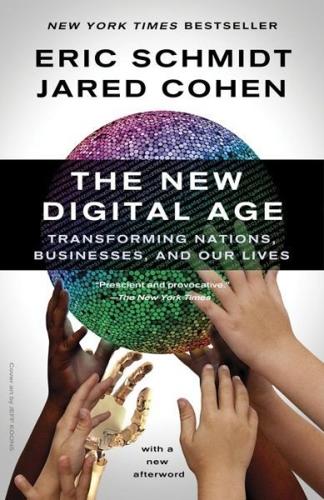
The New Digital Age: Transforming Nations, Businesses, and Our Lives
by
Eric Schmidt
and
Jared Cohen
Published 22 Apr 2013
It is hard enough to get this right in a world that is just physical, but in the new digital age error and miscalculation will occur more often. Internationally, the result will be more cyber conflict and new types of physical wars, and, as we will now see, new revolutions. 1 We recommend the 2006 book Who Controls the Internet?: Illusions of a Borderless World, by Jack Goldsmith and Tim Wu, which puts forth this scenario with great clarity. 2 Internet Balkans, as we refer to them, are different than intranets. An intranet uses the same Internet protocol technology but is limited to a network within an organization or local area, instead of a network of other networks.
…
CHAPTER 3 THE FUTURE OF STATES YouTube in Iran: Gwen Ackerman and Ladane Nasseri, “Google Confirms Gmail and YouTube Blocked in Iran Since Feb. 10,” Bloomberg, February 13, 2012, http://www.bloomberg.com/news/2012-02-13/google-confirms-gmail-and-youtube-blocked-in-iran-since-feb-10.html. We recommend the 2006 book Who Controls the Internet?: Jack Goldsmith and Tim Wu, Who Controls the Internet?: Illusions of a Borderless World (New York: Oxford University Press, 2006). most users tend to stay within their own cultural spheres: Author’s determination based on ten years as CEO of Google and two as executive chairman. Particular terms like “Falun Gong”: Mark McDonald, “Watch Your Language! (In China, They Really Do),” Rendezvous (blog), International Herald Tribune, the global edition of the New York Times, March 13, 2012, http://rendezvous.blogs.nytimes.com/2012/03/13/watch-your-language-and-in-china-they-do/.
…
Sarkozy, Nicolas satellite positioning Saud, Alwaleed bin Talal al- Saudi Arabia, 2.1, 2.2, 3.1, 4.1, 6.1 “Saudi People Demand Hamza Kashgari’s Execution, The” (Facebook group) Save the Children scale effects Schengen Agreement Scott-Railton, John search-engine optimization (SEO), n secession movements secure sockets layer (SSL) security, 2.1, 2.2, 2.3, 2.4 in autocracies censorship and company policy on, 2.1, 2.2 privacy vs., itr.1, 5.1, 5.2 in schools selective memory self-control self-driving cars, itr.1, 1.1, 1.2 September 11, 2001, terrorist attacks of, 3.1, 5.1 Serbia, 4.1, 6.1 servers Shafik, Ahmed shanzhai network, 1.1 sharia Shia Islam Shia uprising Shiites Shock Doctrine, The (Klein), 7.1n short-message-service (SMS) platform, 4.1, 7.1 Shukla, Prakash Sichuan Hongda SIM cards, 5.1, 5.2, 5.3, 6.1, 6.2, nts.1 Singapore, 2.1, 4.1 Singer, Peter, 6.1, 6.2, 6.3, 6.4, 6.5, 6.6, 6.7, 6.8 singularity SkyGrabber Skype, 2.1, 2.2, 2.3, 3.1, 5.1 sleeping rhythms Slim Helú, Carlos smart phones, itr.1, 1.1, 1.2, 5.1, 5.2, 7.1 in failed states peer-to-peer capability on Snapchat Snoad, Nigel social networking, 2.1, 4.1, 5.1 social-networking profiles social prosthetics social robots “socioeconomically at risk” people Solidarity Somalia, 2.1, 5.1, 5.2, 5.3, 6.1n, 210, 7.1, 7.2, 7.3 Sony South Africa, 4.1, 7.1 South Central Los Angeles Southern African Development Community (SADC) South Korea, 3.1, 3.2 South Sudan Soviet Union, 4.1, 6.1 Spain Speak2Tweet Special Weapons Observation Reconnaissance Detection System (SWORDS), 6.1, 6.2 speech-recognition technology spoofing Spotify Sputnik spyware, 3.1, 6.1 Stanford University statecraft State Department, U.S., 5.1, 7.1 states: ambition of future of Storyful, n Strategic Arms Limitation Talks (SALT) Stuxnet worm, 3.1, 3.2 suborbital space travel Sudan suggestion engines Summit Against Violent Extremism Sunni Web supersonic tube commutes supplements supply chains Supreme Council of the Armed Forces (SCAF) surveillance cameras Sweden switches Switzerland synthetic skin grafts Syria, 2.1, 3.1, 4.1, 4.2 uprising in Syrian Telecommunications Establishment tablets, 1.1, 1.2, 7.1 holographic Tacocopter Tahrir Square, 4.1, 4.2, 4.3 Taiwan Taliban, 2.1, 5.1, 7.1 TALON Tanzania technology companies, 2.1, 3.1 Tehran Telecom Egypt telecommunications, reconstruction of telecommunications companies Télécoms Sans Frontières television terrorism, terrorists, 4.1, 5.1, con.1 chat rooms of connectivity and cyber, 3.1n, 153–5, 5.1 hacking by Thailand Thomson Reuters Foundation thought-controlled robotic motion 3-D printing, 1.1, 2.1, 2.2, 5.1 thumbprints Tiananmen Square protest, 3.1, 4.1 Tibet time zones tissue engineers to-do lists Tor service, 2.1, 2.2, 2.3, 3.1, 5.1n Total Information Awareness (TIA) trade transmission towers transparency, 2.1, 4.1 “trespass to chattels” tort, n Trojan horse viruses, 2.1, 3.1 tsunami Tuareg fighters Tumblr Tunisia, 4.1, 4.2, 4.3, 4.4, 4.5 Turkey, 3.1, 3.2, 4.1, 5.1, 6.1 Tutsis Twa Twitter, 2.1, 2.2, 2.3, 2.4, 2.5, 2.6, 2.7, 3.1, 3.2, 4.1, 4.2, 5.1, 5.2, 6.1, 7.1, 7.2, nts.1 Uganda Uighurs, 3.1, 6.1 Ukraine unemployment UNESCO World Heritage Centre unique identification (UID) program United Arab Emirates, 2.1, 2.2, 2.3 United Kingdom, 2.1, 2.2, 2.3, 3.1 United Nations, 4.1, 5.1, 6.1, 7.1 United Nations Security Council, 3.1n, 214, 7.1 United Russia party United States, 3.1, 3.2, 3.3, 4.1, 5.1, 7.1 engineering sector in United States Agency for International Development (USAID) United States Cyber Command (USCYBERCOM) unmanned aerial vehicles (UAVs), 6.1, 6.2, 6.3, 6.4, 6.5 Ürümqi riots user-generated content Ushahidi vacuuming, 1.1, 1.2 Valspar Corporation Venezuela, 2.1, 2.2, 6.1 verification video cameras video chats video games videos Vietcong Vietnam vigilantism violence virtual espionage virtual governance virtual identities, itr.1, 2.1, 2.2 virtual juvenile records virtual kidnapping virtual private networks (VPNs), 2.1, 3.1 virtual reality virtual statehood viruses vitamins Vodafone, 4.1, 7.1 Vodafone/Raya voice-over-Internet-protocol (VoIP) calls, 2.1, 5.1 voice-recognition software, 1.1, 2.1, 5.1 Voilà VPAA statute, n Walesa, Lech walled garden Wall Street Journal, 97 war, itr.1, itr.2, 6.1 decline in Wardak, Abdul Rahim warfare: automated remote warlords, 2.1, 2.2 Watergate Watergate break-in Waters, Carol weapons of mass destruction wearable technology weibos, 62 Wen Jiabao Wenzhou, China West Africa whistle-blowers whistle-blowing websites Who Controls the Internet?: Illusions of a Borderless World (Goldsmith and Wu), 3.1n Whole Earth Catalog (Brand), 2.1n Wi-Fi networks WikiLeaks, itr.1, 2.1, 5.1, 5.2 Wikipedia, 1.1, 6.1 wikis Windows operating system Wingo, Harry Wired, 203 Wired for War: The Robotics Revolution and Conflict in the 21st Century (Singer), 6.1, 6.2 wisdom of the crowds, 2.1, 6.1 women Women2Drive Campaign women’s rights World Food Program (WFP) World Intellectual Property Organization (WIPO), 3.1, 3.2 World Trade Organization (WTO), 3.1, 3.2 World War I World War II World Wide Web, 3.1, 3.2, 3.3 worms, 3.1, 6.1 Wu, Tim, n Xbox 360 video-game console Xi Jinping Yahoo!
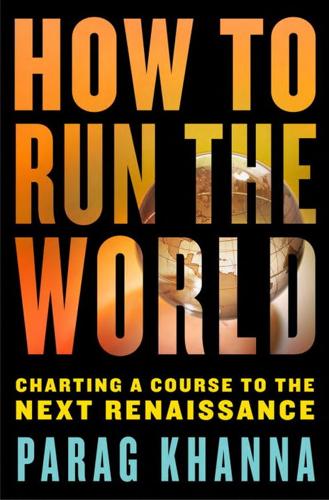
How to Run the World: Charting a Course to the Next Renaissance
by
Parag Khanna
Published 11 Jan 2011
There are councils for security and human rights, commissions for social development and peace building, a division for women, a program for the environment, and an organization for global health. Name the issue, the United Nations has it covered. But how can an organization that caters to bordered states solve the problems of a borderless world? Are pandemics a health issue, a security issue, or both? Is terrorism a political issue, an economic one, or both? What about crop-killing insect infestations at higher altitudes caused by global warming—should the Food and Agriculture Organization or the UN Environment Program handle that?
…
Then there are the mega-billionaires-cum-philanthropists such as Bill Gates, Richard Branson, and Ratan Tata who combat deadly disease, sponsor African schools, and govern steel factory cities, respectively. They represent the interests of their companies and projects far more than their home nations as such, and millions of lives depend on their good works. They increasingly run their own borderless worlds. From clans to corporations, all of the players active in diplomacy a millennium ago are back. The word “diplomacy” stems from the Greek diploun, meaning “to fold,” and refers to the folded diplomas authorizing entry into foreign territories that emissaries carried inside sealed metal plates.
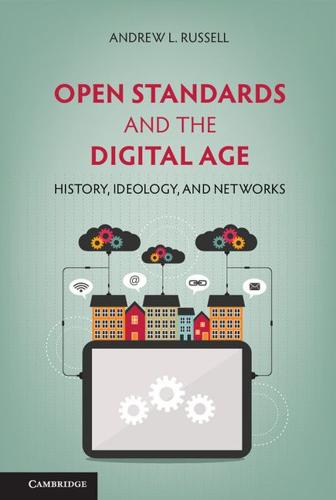
Open Standards and the Digital Age: History, Ideology, and Networks (Cambridge Studies in the Emergence of Global Enterprise)
by
Andrew L. Russell
Published 27 Apr 2014
Zeiler, Globalization and the American Century (New York: Cambridge University Press, 2003); John Gray, False Dawn: The Delusions of Global Capitalism (New York: The New Press, 2000); Phillipe Legrain, Open World: The Truth About Globalization (Chicago: Ivan R. Dee, 2004); Jack Goldsmith and Tim Wu, Who Controls the Internet? Illusions of a Borderless World (New York: Oxford University Press, 2006); Evgeny Morozov, The Net Delusion: The Dark Side of Internet Freedom (New York: Public Affairs, 2011); Stanley Fish, “Anonymity and the Dark Side of the Internet,” January 3, 2011, http://opinionator.blogs.nytimes.com/2011/01/03/anonymity-and-the-dark-side-of-the-internet (accessed January 17, 2012); Nathan Ensmenger, “The Digital Construction of Technology,” Technology & Culture 53 (2012): 753–776. 5 Friedman, The World Is Flat, 187. 6 Global Times, “The Real Stake in the ‘Free Flow of Information,’” January 22, 2010, http://opinion.globaltimes.cn/editorial/2010–01/500324.html (accessed January 17, 2012). 7 Thomas P.
…
Michael Froomkin, “Habermas@Discourse.Net: Toward a Critical Theory of Cyberspace,” Harvard Law Review 116 (2003): 749–873; Simon, Launching the DNS War; Tim O’Reilly, “The Architecture of Participation,” (June 2004), http://oreilly.com/pub/a/oreilly/tim/articles/architecture_of_participation.html (accessed January 3, 2012). 7 Frederick P. Brooks, Jr., The Mythical Man-Month: Essays on Software Engineering Anniversary Edition (Boston: Addison-Wesley, 1995), 40–50. 8 Jack Goldsmith and Tim Wu, Who Controls the Internet? Illusions of a Borderless World (New York: Oxford University Press, 2006); Julian Dibbell, “A Rape in Cyberspace: How an Evil Clown, a Haitian Trickster Spirit, Two Wizards, and a Cast of Dozens Turned a Database into a Society,” The Village Voice (December 23, 1993); Andrew L. Russell, “Constructing Legitimacy: The W3C’s Patent Policy,” in Laura DeNardis, ed., Opening Standards: The Global Politics of Interoperability (Cambridge, MA: The MIT Press, 2011); Gary Wolf, “Why Craigslist Is Such a Mess,” Wired 17 (2009), http://www.wired.com/entertainment/theweb/magazine/17–09/ff_craigslist (accessed January 3, 2012). 9 On the structure and culture of computing research at ARPA, see Arthur L.
…
The Standards Edge: Dynamic Tension. Ann Arbor, MI: Sheridan Press, 2004. Garnet, Robert W. The Telephone Enterprise: The Evolution of the Bell System’s Horizontal Structure, 1876–1909. Baltimore: The Johns Hopkins University Press, 1985. Goldsmith, Jack and Tim Wu. Who Controls the Internet? Illusions of a Borderless World. New York: Oxford University Press, 2006. Gooday, Graeme J. N. The Morals of Measurement: Accuracy, Irony, and Trust in Late Victorian Electrical Practice. New York: Cambridge University Press, 2004. Grindley, Peter, David C. Mowery, and Brian Silverman. “SEMATECH and Collaborative Research: Lessons in the Design of High-Technology Consortia.”
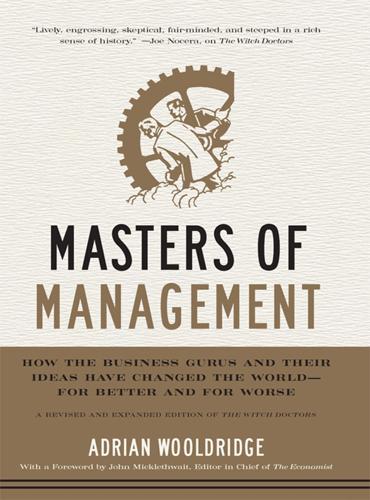
Masters of Management: How the Business Gurus and Their Ideas Have Changed the World—for Better and for Worse
by
Adrian Wooldridge
Published 29 Nov 2011
He filled his pages with descriptions of factories in far-flung corners of the world and with anecdotes about rising business people. He also had a gift for memorable phrases: “the electronic herd” for currency traders, the “golden straightjacket” for the market-friendly rules that governments must wear if they want to thrive in a borderless world. He morphed Das Kapital into “DOS Capital” and propounded the “golden arches theory”—that no two countries lucky enough to have McDonald’s restaurants will go to war with each other. Friedman returned to his first calling, the Middle East, in the wake of September 11, when, as it were, the Lexus and the Olive Tree collided with each other with horrific consequences, becoming one of America’s leading “liberal hawks” and providing powerful support for preemptive action to reorder the Middle East.
…
This brings us to another common misunderstanding about globalization: the idea that globalization is marginalizing the nation-state and consigning politicians to the trash can of history. This idea has plenty of support among management gurus. Kenichi Ohmae has published a succession of books hammering home the argument, such as The Borderless World (1990) and The End of the Nation State (1995). (For all his celebration of “borderlessness,” Ohmae’s fame depended on his ability to explain America to Japan and Japan to America.) The left has also jumped on the “borderless” bandwagon. Naomi Klein and various “Kleinians” like Noreena Hertz have long argued that the world’s biggest multinational companies are bigger than all but a handful of nation-states.10 These multinational giants are the real masters of the universe, the argument goes; governments are mere playthings by comparison, constantly adjusting their policies to attract foreign investment and to prevent domestic companies from fleeing abroad.
…
See Boston Consulting Group Beals, Vaughn, 320 Beck, Glenn, 388 Beinhocker, Eric, 265–266 Bell, Daniel, 345 Ben & Jerry’s, 195, 247 Bennis, Warren, 307, 392, 403, 408 Berglas, Steven, 406 Berlin, Isaiah, 76, 396 Bernhard, Wolfgang, 53 Bernstein, Ann, 39 Best Buy, 66 Better Capital, 395 Bevan, Nye, 315 Bhattacharya, Arindam, 64 Bhide, Amar, 176, 200 Bieber, Justin, 243 Bilderberg Group, 53 Bimbo, 206 Birt, John, 314, 315 Bishop, Matthew, 47 Black, Conrad, 309 Black & Decker, 206 The Black Swan: The Impact of the Highly Improbably (Taleb), 149–150 Blair, Tony, 44, 315, 320, 401 Blink, 118, 120 Bloom, Nick, 12 BMW, 247, 347 Boardroom, 291–311 women and, 304–305 Boeing, 53, 298 Bombay Stock Exchange, 287 Booth School (Chicago Business School), 51, 57, 61 Booz Allen Hamilton, 64, 298, 343, 354, 404 The Borderless World (Ohmae), 277 Boston Consulting Group (BCG), 5, 52, 63, 64, 111, 223, 228, 254, 267, 364 Boston Pizza, 353 Bower, Joseph, 301 Bower, Marvin, 49–50, 63 BP, 17, 43–45, 280, 301, 320, 358 Brainworkers, 363–390 Brands, 215–216, 272 Branson, Richard, 155, 163, 171–172, 195, 197, 309, 320 Bratton, William, 30–31, 321–322 Brave New World (Huxley), 80 Brecht, Bertolt, 80 BrightHouse, 235 Brin, Sergey, 109–110, 163, 164, 195, 196 British Broadcasting Corporation (BBC), 314, 358 British Children’s Society, 360 British Equal Opportunities Commission, 304 Brochet, Francois, 297 Broughton, Philip Delves, 2–3, 14 Browder, Bill, 139 Browder, Earl, 139 Brown, Gordon, 320 Brown, John Seely, 64, 224, 229 Brown, Shona, 144 Browne, John, 44, 320 Bryan, Lowell, 111 BSkyB, 36 Buckingham, Marcus, 65 Buffett, Warren, 309, 388 Built to Last: Successful Habits of Visionary Companies (Collins and Porras), 112, 262 Burns, C.
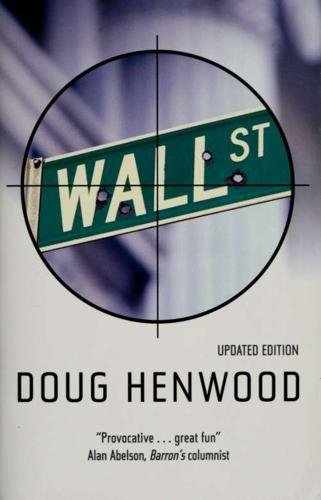
Wall Street: How It Works And for Whom
by
Doug Henwood
Published 30 Aug 1998
Star investors — names are omitted to avoid lawsuits — will often let it drop that they think the yen is overvalued, or that they've just bought gold; when the masses act on this information, the position, whatever its initial wisdom, becomes a winner. No unknowing chumps here. capital unbound So far, this review has concentrated on the U.S. While this simplifies things, it's hardly a fair representation of how we invest today. Capital and commodities traverse the globe with remarkable freedom. Though casual observers treat this borderless world as a recent invention, it's more than a little reminiscent of life before World War I. That idyllic world was nicely evoked by John Maynard Keynes (1988, pp. 11-12), no doubt one of these once-charmed Londoners he wrote about: The inhabitant of London could order by telephone, sipping his morning tea in bed, the various products of the whole earth, in such quantity as he might see fit, and reasonably expect their early delivery upon his doorstep; he could at the same moment and by the same means adventure his wealth in the natural resources and new enterprises of any quarter of the world, and share, without exertion or even trouble, in their prospective fruits and advantages; or he could decide to couple the security of his fortunes with the good faith of the townspeople of any substantial municipality in any continent that fancy or information might recommend.
…
These feelings, which I should be sorry to see weakened, induce most men of property to be satisfied with a low rate of profits in their own country, rather than seek a more advantageous employment for their wealth in foreign nations.■*" Ricardo's sentimental patriotism is a long way from the heartless, landless sentiments of Stronach and the Colgate exec. It remains to be seen whether this borderless world is more permanent than the one described by Keynes, or whether war, depression, and/or political rebellion will smash the idyll once again. Recalling Keynes, though, should caution against the common habit of treating the globalized present as something utterly new. The share of exports in Britain's GDP was only a bit higher in 1992 than it was in 1913, and the U.S. of 1996 is no match for either.
…
Attempts to evade the tax, he argued, could be managed by having it administered by the IMF — even making compliance with the tax a condition of membership. Proceeds of the tax could be used for "worthwhile international purposes" — funding the UN, the World Bank, and the IMF, for example. The latter institutions have contributed greatly to creating the borderless world Tobin bemoans, but liberals rarely seem to have problems with contradictions like this. Tobin has also argued for a similar tax on stock trades. Tobin lodged a dissent from the tame official recommendations of the Twentieth Century Fund's (1992) Task Force on Market Speculation and Corporate Governance.
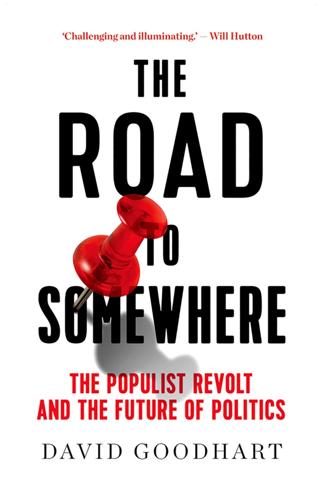
The Road to Somewhere: The Populist Revolt and the Future of Politics
by
David Goodhart
Published 7 Jan 2017
This in a nutshell is their worldview: they broadly welcome change and are not nostalgic for a lost Britain; they fully embrace egalitarian and meritocratic attitudes on race, sexuality and gender (and sometimes class) and think that we need to push on further; they do not in the main embrace a borderless world but they are individualists and internationalists who are not strongly attached to larger group identities, including national ones; they value autonomy and self-realisation before stability, community and tradition. The average Somewhere is on a middling income, having left school before doing A-levels.
…
It is right to say that the world is significantly more economically interdependent than fifty years ago, and nation states have voluntarily vested more of their sovereignty in international regulations and institutions such as NATO, the World Trade Organisation and the Basel financial regulators club. Moreover, global tourism and the internet reinforce the metaphor of a ‘borderless world’. But it is mainly a metaphor. Thomas Friedman’s paean to globalisation, The World is Flat, is now widely regarded as ‘globaloney’.6 Professor Pankaj Ghemawat, one of the leading critics of globaloney has shown convincingly that distance most certainly does still matter. Less than 25 per cent of global economic activity is international, and most of that is regional, and foreign direct investment accounts for less than 10 per cent of all fixed investment worldwide.
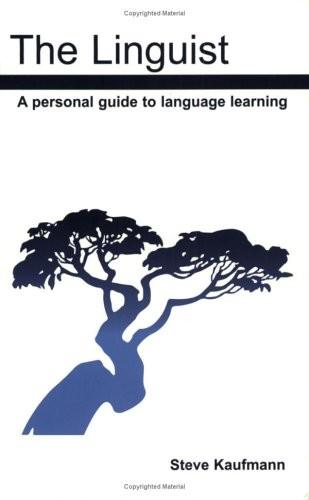
The Linguist: A Personal Guide to Language Learning
by
Steve Kaufmann
Published 15 Jan 2003
However, an even greater sense of comfort is available to those of us who recognize that, as individuals, we are all equal members of the human family. Japan is facing many economic difficulties today. The traditional hierarchical structure of Japanese society has inhibited the input of the younger generation towards solving these problems. This will likely change. In what Kennichi Ohmae, a leading Japanese thinker, calls “the modern borderless world,” increased knowledge of foreign languages will ensure a greater diversity of perspectives on issues affecting Japanese society. 66 A Personal Guide to Language Learning Exploring Languages at Home Without going outside, you may know the whole world. Without looking through the window, you may see the ways of heaven. – Laozi It is always easiest to learn a language when you are living in a society that speaks that language if you take advantage of the opportunities that surround you.
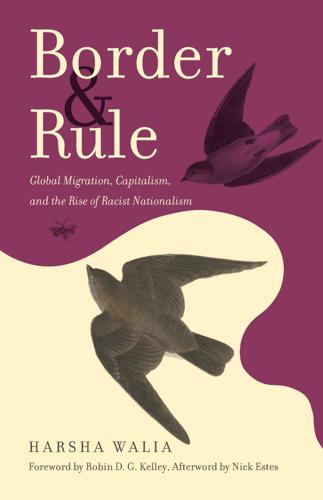
Border and Rule: Global Migration, Capitalism, and the Rise of Racist Nationalism
by
Harsha Walia
Published 9 Feb 2021
(Minneapolis: University of Minnesota Press, 2018), xvi. 119.Nesima Aberra, “How Anti-Blackness Is Making the World Ignore African Refugees,” Everyday Feminism, October 25, 2017, https://everydayfeminism.com/2017/10/anti-blackness-african-refugees/. 120.Ruben Andersson, “Rescued and Caught: The Humanitarian-Security Nexus at Europe’s Frontiers,” in De Genova, The Borders of “Europe,” 81. 121.Vilna Bashi, “Globalized Anti-Blackness: Transnationalizing Western Immigration Law, Policy, and Practice,” Ethnic and Racial Studies 27, no. 4 (2004): 584-606. 122.Peo Hansen and Stefan Jonsson, “Building Eurafrica: Reviving Colonialism through European Integration, 1920-1960,” in Echoes of Empire: Memory, Identity and the Legacy of Imperialism, Kalypso Nicoläidis, Berny Sèbe, and Gabrielle Maas, eds. (London: I.B. Tauris, 2015), 209-26. 123.Achille Mbembe, “The Idea of a Borderless World,” Africa Is a Country, November 11, 2018, https://africasacountry.com/2018/11/the-idea-of-a-borderless-world. Chapter 7 1.Soumaoro Aboubakar, “The Murder of a Trade Unionist,” Jacobin Magazine, June 10, 2018, www.jacobinmag.com/2018/06/italy-soumayla-sacko-murder-migrant-labor-lega. 2.“Over One-Third of Farmworkers in Italy Are Foreigners,” Info Migrants, October 28, 2019, www.infomigrants.net/en/post/20422/over-one-third-of-farmworkers-in-italy-are-foreigners; Maged Srour, “‘Agromafia’ Exploits Hundreds of Thousands of Agricultural Workers in Italy,” Inter Press Service, July 2018, www.ipsnews.net/2018/07/agromafia-exploits-hundreds-thousands-agricultural-workers-italy/. 3.Asfa-Wossen Asserate, African Exodus (London: Haus Publishing, 2018), 153. 4.Martin Khor and Tetteh Hormeku, “The Impact of Globalisation and Liberalisation on Agriculture and Small Farmers in Developing Countries: The Experience of Ghana,” Third World Network, January 2006. 5.Nicholas De Genova, “Migrant ‘Illegality’ and Deportability in Everyday Life,” Annual Review of Anthropology 31 (2002): 439. 6.Thomas Friedman, “Trump Is Wasting Our Immigration Crisis,” New York Times, April 23, 2019, www.nytimes.com/2019/04/23/opinion/trump-immigration-border-wall.html. 7.Amnesty International, Exploited Labour: Migrant Workers in Italy’s Agricultural Sector, December 18, 2012, www.amnestyusa.org/files/exploited_labour.
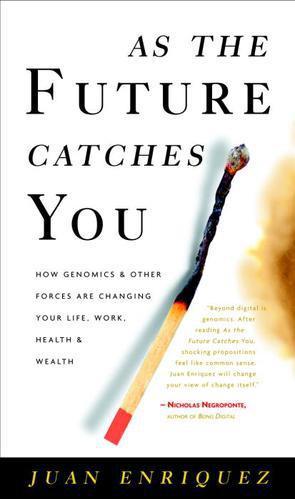
As the Future Catches You: How Genomics & Other Forces Are Changing Your Work, Health & Wealth
by
Juan Enriquez
Published 15 Feb 2001
Millennium Pharmaceuticals alone … A midsize genomics company founded by an MIT professor … Had 1,500 patents pending in 2000 … And was worth more than everything produced … In Lithuania plus Estonia over the course of a year. Many of MIT’s most successful alumni and faculty … Are foreigners who chose to stay in the United States. In a borderless world … Those who do not educate … And keep their citizens … Will lose most intellectual wars. (The United States has gotten lazy in this area … It prefers to import brains rather than generating them in its high schools … More on this later.) The consequences of free trade … In a technology-driven world … Are different from having open borders … In a commodity-driven world economy.
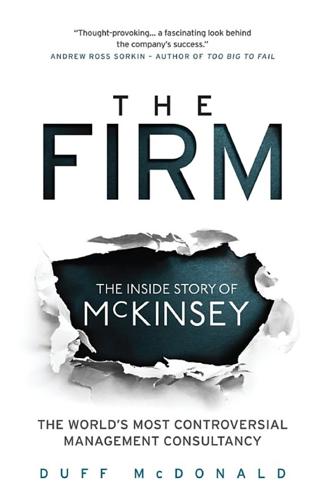
The Firm
by
Duff McDonald
Published 1 Jun 2014
But Triad Power did just fine. Ohmae wrote thirty-seven editorials for the Wall Street Journal. He didn’t need any help.”43 That’s not entirely true: The unsung man in the background of this event was Alan Kantrow, who moved to Tokyo for several years to be Ohmae’s “thought partner.” Ohmae’s 1990 book, The Borderless World, correctly foresaw the era of corporations overtaking governments as the most powerful entities on the planet. The firm’s 1993 annual report included the joke: “We published 11 books last year. Only 3 were by Ken Ohmae.” The first native Japanese to run the Tokyo office, Ohmae became office manager in 1979, and the office made its first positive financial contribution to the firm in 1981.44 More important, Ohmae helped establish an elite reputation for the firm in Japan.
…
See also specific book or author Booz & Company, 171 Booz Allen Hamilton: in China, 230 European expansion of, 74 founding of, 26 government consulting of, 72 as McKinsey competitor, 55, 171, 182, 203, 204, 205 as private company, 118 as public company, 118 revenue/fees for, 138, 203 top clients of, 182 Booz, Edwin, 26 Borch, Fred, 113, 114 Borden Chemical, 305 The Borderless World (Ohmae), 162 Bose, Partha, 123, 137, 143, 157, 163, 216, 217, 218, 223, 229 Boston Consulting Group (BCG): best companies to work for survey and, 328 clients of, 110 founding of, 88–89 four-box matrix of, 88, 109, 113, 140, 143, 144 Harvard recruiting by, 110 influence on consulting business of, 112–13 knowledge-building at, 217 and knowledge focus in consulting, 139 McKinsey alumni at, 304 McKinsey compared with, 114 as McKinsey competitor, 88–89, 109–11, 112, 115, 116, 138, 140, 142, 156, 167, 197, 226, 264 offshoots of, 110–11 and Ohmae’s influence on McKinsey, 164 Peters and Waterman’s work and, 149 products of, 109–10 size of, 142 “strategy consulting” at, 88–89, 140 Boston, Massachusetts: McKinsey office in, 37, 52, 53, 165 Bower, Helen McLaughlin (wife), 33, 34, 42, 62, 73, 87, 270 Bower, Marvin: accomplishments of, 326 ambitions of, 33–34, 35, 39, 51, 62 Bales-NYC controversy and, 71–72 clients of, 39, 44–45, 108 colleague relationships with, 37–38 compensation/financial affairs of, 38, 42–43, 87 Crockett and, 56–57 culture/values at McKinsey and, 44, 61, 74, 116, 125, 208, 219, 265, 270, 271, 275, 319, 320, 321, 322, 325, 335 Daniel and, 126, 134–35 and “dark years” for McKinsey, 104 death of, 270–71 decline in relevance of, 130–31 early years with McKinsey of, 34–35 economy as advantageous to tenure of, 136 Eisenhower comment to, 68 and election of managing directors, 101 elitism of, 93–94 as embodiment of McKinsey & Company, 49 and equity stakes with clients, 234, 265 executive committee of, 66, 94, 100, 138, 277 frugality of, 87–88, 118, 128 gains control of McKinsey, 56–57 generalist model and, 120 goal of, 4 and growth/expansion of McKinsey, 73, 75–76, 95, 171 Gupta compared with, 225 and Harvard case study approach, 83 and incorporation of McKinsey, 86 influence on McKinsey of, 35, 61, 62, 116 and joint venture proposal, 117–18 legacy of, 101, 219, 270–71 McDonald relationship with, 128, 129, 130 McKinsey alumni and, 84 McKinsey bureaucracy and, 277 McKinsey compensation system and, 145, 165, 208 and McKinsey competition, 167, 203 and McKinsey dealings with management level, 63–64 and McKinsey exceptionalism, 94 McKinsey (James O.) and, 24–25, 32, 34, 35, 36, 95 as McKinsey (James O.) successor, 4, 56–57, 61–62 and McKinsey leadership structure, 138 McKinsey mission and, 169 McKinsey revenue/fees and, 266, 323 and nonfinancial rewards for professionals, 119 “one firm” philosophy of, 31–32 on Parker in London office, 75 as partner in McKinsey, Wellington, 31 partners’ views about leadership of, 129 and Patton work on executive compensation, 65–66 personal and early professional background of, 32–34 personality/style of, 4, 41, 49, 62, 63–64, 87, 134–35 Peters and Waterman’s work and, 149, 154–55 power of, 158 and products for clients, 109 professionalism focus of, 105, 124, 260 Reilly payments and, 130 as repeater, 41–42, 44 reputation of, 118 retirement of, 95, 100 role in McKinsey & Company of, 31, 36, 37, 39, 41 and secret of success, 191 as selling back shares in McKinsey, 42–43 successors to, 100–102 technology views of, 171 tenure of, 101, 135, 136 training and consistency focus of, 85 up-or-out approach and, 83 views about clients of, 39, 44–45, 58–59, 108, 109, 123, 225, 234, 266, 275 views about consultants/consulting, 15, 31, 41, 43–45, 46, 124, 208 as visionary, 32, 96, 97 Walton relationship with, 105 and Wellington-McKinsey merger, 31–32, 37 writings of, 36, 44, 48, 52, 69 and youth as prized over experience, 80.
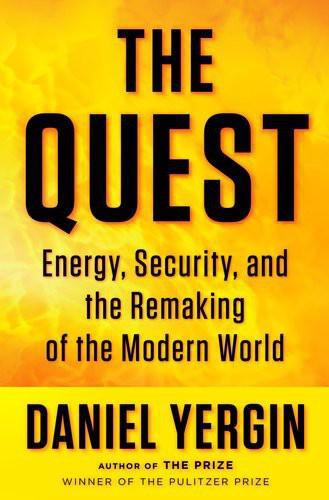
The Quest: Energy, Security, and the Remaking of the Modern World
by
Daniel Yergin
Published 14 May 2011
Soon the crisis spread, threatening the whole region and the entire Asian Economic Miracle, with far-reaching impact on global finance and the world economy. It would also detonate a transformation in the oil industry. THE “ASIAN ECONOMIC MIRACLE” The title of a popular business book, The Borderless World, captured the abounding optimism about the process of globalization in the 1990s that was knitting together the different parts of the world economy. World trade was growing faster than the world economy itself.1 Asia was at the forefront. The “Asian tigers”—South Korea, Taiwan, Hong Kong, and Singapore, and behind them the “new tigers” of Malaysia, Indonesia, Thailand, and the Philippines, plus China’s Guangdong Province—were emulating Japan’s great economic success.
…
House of Representatives Committee on International Relations, Subcommittee on Asia and the Pacific, February 12, 1998 (“Central Asia,” cost-effectiveness); Interview with John Imle and Marty Miller; Steve Coll, Ghost Wars: The Secret History of the CIA, Afghanistan, and Bin Laden, from the Soviet Invasion to September 10, 2001 (New York: The Penguin Press, 2004), pp. 309–10. 12 Mikhail Gorbachev, “Soviet Lessons from Afghanistan,” International Herald Tribune, February 4, 2010. 13 Ahmed Rashid, Taliban: Militant Islam, Oil and Fundamentalism in Central Asia (New York: Yale University Press, 2000), ch. 3 (Islamic Emirate). 14 Christian Science Monitor, February 9, 2007 (“alien”); interviews; Washington Post, October 5, 1998 (“implement”). 15 Coll, Ghost Wars, pp. 309–13 (“no policy,” “authorized”); interview with John Imle; “Political and Economic Assessment of Afghanistan, Iran, Pakistan, and Turkemnistan/Russia,” Unocal Report, September 3, 1996 (“involvement”). 16 Unocal Report (“scenario”); Coll, Ghost Wars, pp. 331, 342 (“spiritual leaders”). 17 Rosita Forbes, Conflict: Angora to Afghanistan (London: Cassell, 1931), p. xvi (“anathema”); interviews with John Imle and Marty Miller. Chapter 4: “Supermajors” 1 Kenichi Ohmae, The Borderless World: Power and Strategy in the Interlinked Economy (New York: HarperCollins, 1991). 2 New York Times, December 1, 1997 (“reasonable”); Petroleum Intelligence Weekly, December 8, 1997 (“economic stars”). 3 Carmen Reinhart and Kenneth Rogoff, This Time Is Different: Eight Centuries of Financial Folly (Princeton: Princeton University Press, 2009), pp. 18, 157 (“darling”); Timothy J.
…
High-Impact, Low-Frequency Event Risk to the North American Bulk Power System. June 2010. Nye, David. Electrifying America: Social Meanings of a New Technology. Cambridge: MIT Press, 1992. O’Brien, Dennis J. “The Oil Crisis and the Foreign Policy of the Wilson Administration, 1917–1921.” PhD dissertation. University of Missouri, 1974. Ohmae, Kenichi. The Borderless World: Power and Strategy in the Interlinked Economy. New York: HarperCollins, 1991. Oil Depletion Analysis Centre. “New Oil Projects Cannot Meet World Needs This Decade.” Ashland, Ore.: From the Wilderness Publications, November 16, 2004. Oliver, Hongyan, Kelly Sims Gallagher, Donglian Tian, and Jinhua Zhang.
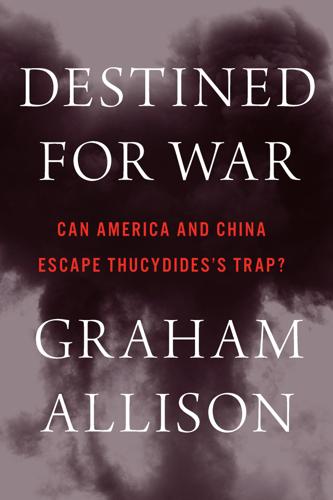
Destined for War: America, China, and Thucydides's Trap
by
Graham Allison
Published 29 May 2017
As the English academic George Edmundson has noted, each nation was “instinctively conscious that its destiny was upon the water, and that mastery of the seas was a necessity of national existence.”26 Both believed there were only two choices in this zero-sum game: “either the voluntary submission of one of the rivals to the other, or a trial of strength by ordeal of battle.”27 The Dutch Republic’s position in the world of the seventeenth century stood on two pillars: free trade and freedom of navigation. A “borderless” world enabled the tiny Netherlands to translate high productivity and efficiency into outsized political and economic heft—a feat London thought came at its own expense. There was, as political scientist Jack Levy puts it, “widespread belief in England that the Dutch economic success was built on the exploitation of England.”28 During the first half of the century, England was too weak to challenge the Dutch-imposed order.
…
With trading posts across the Silk Road, South America, West Africa, Japan, and the Pacific islands, as well as colonies in India and what later became New York, the Dutch Republic in the mid-seventeenth century was the world’s leader in international commerce. It used this power to construct a “borderless” world order, which enabled the tiny Netherlands to translate high productivity and efficiency into outsized political and economic power. Thus, lucrative trading routes gave the publicly owned Dutch East India Company a leading role in the global spice trade. Arguably the Continent’s most advanced seafaring people, the Dutch built a navy to match their massive overseas trading empire.
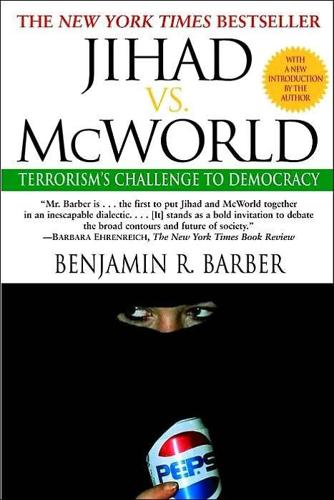
Jihad vs. McWorld: Terrorism's Challenge to Democracy
by
Benjamin Barber
Published 20 Apr 2010
Adrian Lyttelton, “Italy: The Triumph of TV,” The New York Review of Books, August 11, 1994, pp. 25–29. 30. Gore Vidal, Screening History (Cambridge: Harvard University Press, 1992), p. 81. 31. Mark Crispin Miller, Boxed In: The Culture of TV(Evanston, Illinois: Northwestern University Press, 1988), p. 19. 32. Kenichi Ohmae, The Borderless World: Power and Strategy in the Interlinked Economy (New York: Harper Business, 1990), p. xiv. 33. Moisi is deputy director of the French Institute for International Relations; cited in Roger Cohen, “The French, Disneyed and Jurassick, Fear Erosion,” The New York Times, November 21, 1993, p. E 2.
…
For a biography of one of the great masters of communications and entertainment who set the course for many of the men here, see Connie Bruck, Master of the Game: Steve Ross and the Creation of Time Warner (New York: Simon & Schuster, 1994). 8. Fortune says Malone is now worth over a billion dollars. His sobriquet as king of cable is reported by Allen R. Myerson, “A Corporate Man and a Cable King,” The New York Times, October 14, 1993, p. C 7. 9. The declaration is offered as an appendix in Kenichi Ohmae, The Borderless World: Power and Strategy in the Interlinked Economy (New York: Harper Business, 1990). 10. Cited by Ken Auletta, “Under the Wire,” The New Yorker, January 17, 1994, p. 52. Gore genuinely believes in the role of government as a regulator and equalizer, but after the elections of November 1994, there is little to suggest he will get much support in Congress or the nation.
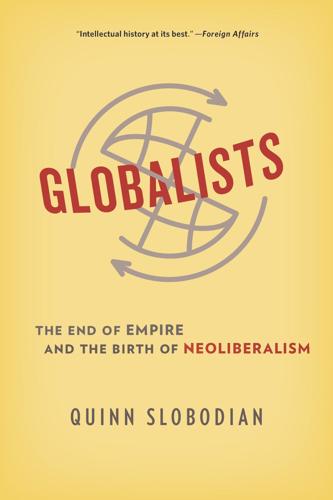
Globalists
by
Quinn Slobodian
Published 16 Mar 2018
He cited the examples of Greece and China, which had been admitted as equals into the League of Nations but only with the “continuation of some sort of control over [their] finances,” and the financial oversight of Austria and Hungary, which followed the same pattern.25 Atomistic national political equality, in other words, could coexist within what Bonn called the “invisible economic empire” of trade and exchange that was global.26 A political world of borders could coexist, and had coexisted (in the liberal imagination, if not reality) within a borderless world economy. Bonn believed that decolonization and planning were two sides of a linked misunderstanding of the scale and form of what worked in an interdependent world. Yet the ultimate traitor to the model of one-world-economy-many-polities came not from the periphery but from the core. The central enabling condition of the invisible economic empire had been the predictability of currency value and the trust in the contract, the bill of exchange, and the loan that it created.
…
In an exploration of neoliberal federalism, one scholar notes that the American Enterprise Institute set up a Federalism Project in 2000, pursuing Buchanan’s proposals from the 1990s to preserve “an effective exit option in market relationships.”24 An AEI resident scholar explained the vision of the project: “A world without borders is a world without exits. We need the exits.”25 These imaginaries are far from the borderless world or zero-state society in which neoliberals purportedly believed.26 What has been described in these pages is much less easy to dismiss as a fanciful delusion. More realistic and, at least in theory, more realizable, is ordoglobalism’s vision of a doubled world: divided and encased between imperium and dominium.
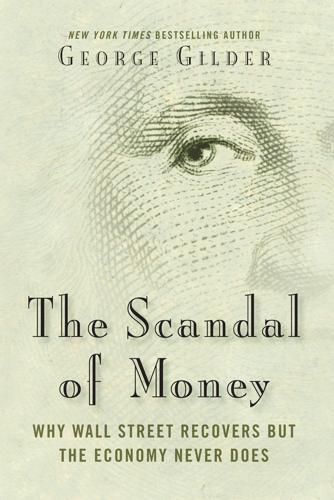
The Scandal of Money
by
George Gilder
Published 23 Feb 2016
Economists evidently agree that currency prices fail to gauge actual values. 4.These statistics comparing foreign exchange market (forex) trading with total stock market and goods and services trade are calculated from the total of daily foreign exchange transactions published every three years by the Bank for International Settlements (BIS). This number is then compared to global international stock market trading and goods and services trade divided by the number of days. Kenichi Ohmae of McKinsey & Company wrote a book titled The Borderless World (New York, NY: HarperCollins, 1990) at a time when trading volume was $600 billion a day, compared with related goods and services trade of $600 billion yearly: “No one can argue that FX trading is still a mere adjunct to other forms of economic activity. It is an end in itself.” 5.“Twenty First Century Capitalism,” chapter 17 in Nathan K.
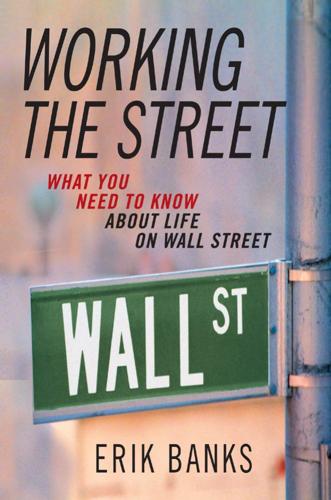
Working the Street: What You Need to Know About Life on Wall Street
by
Erik Banks
Published 7 Feb 2004
That means when you go abroad, you’ll be helping the firm make sure that its foreign outposts remain important—by figuring how to do business and figuring out what business to do, and by making sure the place doesn’t blow up in the process (you know, that tendency to play with very sharp scissors when Mom’s in the other room). In short, you need to make sure that the firm’s foreign presence continues to matter, because in this very global and borderless world, it should matter. YOU GET TO BE YOUR OWN BOSS What’s it really like when you’re thousands of miles away from the Big Machine, from the frenzy, excitement, tension, politics, and intrigue? In a word: great. Within a week of hitting the ground you’ll realize that your responsibilities have just multiplied rapidly and dramatically.
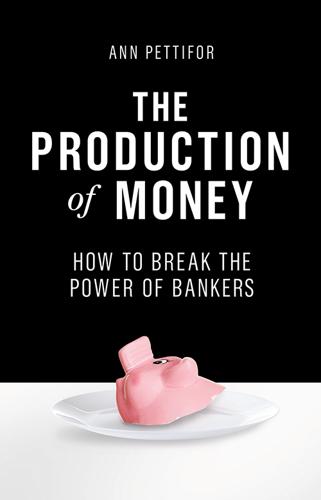
The Production of Money: How to Break the Power of Banks
by
Ann Pettifor
Published 27 Mar 2017
Western Europe’s return to prosperity was also achieved without capital account convertibility … In short, when we penetrate the fog of implausible assertions that surrounds the case for free capital mobility we realize that the idea and the ideology of free trade and its benefits … have been used to bamboozle us into celebrating the new world of trillions of dollars moving daily in a borderless world.12 Just as a well-managed banking system ends society’s dependence on robber barons at home, so should a well-developed and sound banking system end society’s and the economy’s reliance on international, mobile capital. With a managed domestic banking system, operated in the interests of both industry and labour, then government, industry and labour need not depend on, or fear, ‘bond vigilantes’ or ‘global capital markets’.
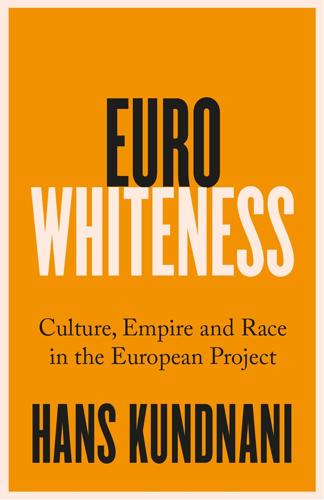
Eurowhiteness: Culture, Empire and Race in the European Project
by
Hans Kundnani
Published 16 Aug 2023
Yet the idea of a “cosmopolitan Europe” goes further, seeing a European federal republic as a “starting point for the creation of a regime of a future Weltinnenpolitik (‘world domestic politics’) based on international treaties”.4 Elsewhere, Habermas writes that the EU is “an important stage along the route towards a “politically constituted world society”.5 Thus the EU can “re-embed” liberalism not just on behalf of Europeans but for the whole of humanity with the “cosmopolitan goal of creating the conditions necessary for a global domestic policy”.6 Habermas was making these arguments at a moment of optimism among “pro-Europeans”, who, in the context of the transformation of Europe after the end of the Cold War and the enlargement of the EU to include central and eastern European countries, began to believe that the whole world could be remade in the image of the EU—a moment I examine in more depth in chapter 4. At the time of writing, however, this seems much less plausible. For example, in the first two decades after the end of the Cold War, it was still possible to believe that the removal of borders within the EU was a precursor to a borderless world. But during the last decade, and especially since the refugee crisis in 2015, the EU has come to see a hard external border as the necessary corollary of the removal of internal borders. Another influential theorist of the idea of “cosmopolitan Europe” is the sociologist Ulrich Beck. As in Habermas’s writing on cosmopolitan Europe, there is an ambiguity about whether it is the real existing EU or a possible future EU that Beck sees as “cosmopolitan”.
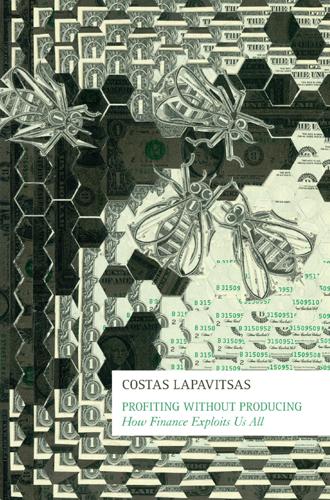
Profiting Without Producing: How Finance Exploits Us All
by
Costas Lapavitsas
Published 14 Aug 2013
However, the monetary basis of financialization has also been important for developed countries, and nowhere more so that in Europe, as is shown in Chapter 9. 1 The literature on globalization is vast and has a natural overlap with the debates on imperialism, see note 1 in Chapter 3. Several of the tropes of the mainstream can be found in Kenichi Ohmae (The Borderless World, 1990), including the notion of an interlinked world economy that is pushing the nation state toward irrelevance. At about the same time David Harvey (The Condition of Postmodernity, 1989) argued, from a Marxist perspective, that a post-modern, fragmented capitalism had emerged, based on the ‘compression of time-space’ according to the dictates of global capital.
…
North, Peter, Money and Liberation: The Micropolitics of Alternative Currency Movements, Minneapolis: University of Minnesota Press, 2007. O’Mahony, Mary, and Bart van Ark (eds), EU Productivity and Competitiveness: An Industry Perspective, Luxemburg: Office for Official Publications of the European Communities, 2003. Ohmae, Kenichi, The Borderless World, London: HarperCollins, 1990. Oliner, Stephen, and Daniel Sichel, ‘Information Technology and Productivity: Where are we Now and Where are we Going?’, Economic Review, Federal Reserve Bank of Atlanta, Third Quarter, 2002, pp. 15–44. Oliner, Stephen, and Daniel Sichel, ‘The Resurgence of Growth in the Late 1990s: Is Information Technology the Story?’
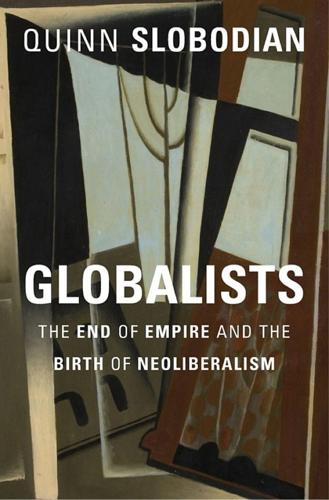
Globalists: The End of Empire and the Birth of Neoliberalism
by
Quinn Slobodian
Published 16 Mar 2018
He cited the examples of Greece and China, which had been admitted as equals into the League of Nations but only with the “continuation of some sort of control over [their] finances,” and the financial oversight of Austria and Hungary, which followed the same pattern.25 Atomistic national political equality, in other words, could coexist within what Bonn called the “invisible economic empire” of trade and exchange that was global.26 A political world of borders could coexist, and had coexisted (in the liberal imagination, if not reality) within a borderless world economy. Bonn believed that decolonization and planning were two sides of a linked misunderstanding of the scale and form of what worked in an interdependent world. Yet the ultimate traitor to the model of 98 GLOBALISTS one-world-economy-many-polities came not from the periphery but from the core.
…
In an exploration of neoliberal federalism, one scholar notes that the American Enterprise Institute set up a Federalism Project in 2000, pursuing Buchanan’s proposals from the 1990s to preserve “an effective exit option in market relationships.”24 An AEI resident scholar explained the vision of the project: “A world without borders is a world without exits. We need the exits.”25 These imaginaries are far from the borderless world or zero-state society in which neoliberals purportedly believed.26 What has been described in t hese pages is much less easy to dismiss as a fanciful delusion. More realistic and, at least in theory, more realizable, is ordoglobalism’s vision of a doubled world: divided and encased between imperium and dominium.
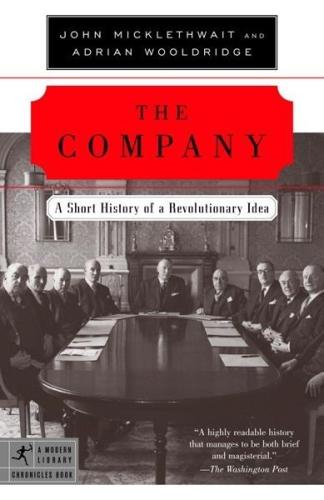
Company: A Short History of a Revolutionary Idea
by
John Micklethwait
and
Adrian Wooldridge
Published 4 Mar 2003
By the early 1980s, the Americans were on the defensive, pinned back by German multinationals and humiliated by the Japanese (see chapter 7). Trying to view the history of multinationals through nationalistic lenses becomes harder in the final quarter of the twentieth century. This, after all, was a time when the business sections of bookshops groaned with titles such as The Borderless World, The Twilight of Sovereignty, and Sovereignty at Bay. A famous essay in the Harvard Business Review in 1983 by Theodore Levitt argued that “the earth is round but for most purposes, it is sensible to treat it as flat.” That was overstating it. Geography did still matter. In 1995, the top one hundred companies by market valuation included forty-three from the United States, twenty-seven from Japan, eleven from Great Britain, and five from Germany.
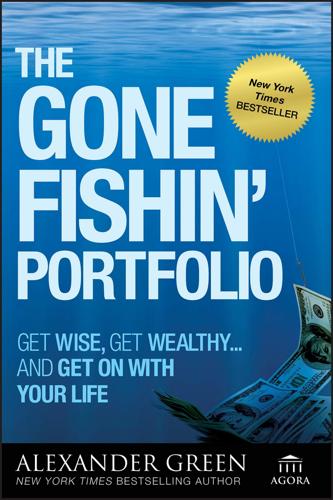
The Gone Fishin' Portfolio: Get Wise, Get Wealthy...and Get on With Your Life
by
Alexander Green
Published 15 Sep 2008
We’re audacious, some say, to put half our equity money in foreign shares. But U.S. stocks account for only about 40% of the world’s market capitalization. The rest of the world accounts for 60%. It makes sense to build an equity portfolio that reflects the success of capitalism in our increasingly borderless world. According to Global Insight, a comprehensive provider of economic, financial, and political analysis, in the early 1980s, the United States accounted for a third of the global economy. In the next 20 years, that share could be cut in half. It’s reasonable to expect that growth of this magnitude will positively influence foreign share prices.

The Filter Bubble: What the Internet Is Hiding From You
by
Eli Pariser
Published 11 May 2011
NYU Primary Sources (New York, NY), 2011, accessed Feb 9, 2011, http://nyuprimarysources.org/video-library/jay-rosen-and-clay-shirky/. 61 “many wresting power from the few”: Lev Grossman, “Time’s Person of the Year: You,” Time, Dec. 13, 2006, accessed Dec. 11, 2010, www.time.com/time/magazine/article/0,9171,1569514,00.html. 61 “did not eliminate intermediaries”: Jack Goldsmith and Tim Wu, Who Controls the Internet? Illusions of a Borderless World (New York: Oxford University Press, 2006), 70. 62 “It will remember what you know”: Danny Sullivan, “Google CEO Eric Schmidt on Newspapers & Journalism,” Search Engine Land, Oct. 3, 2009, accessed Dec. 11, 2010, http://searchengineland.com/google-ceo-eric-schmidt-on-newspapers-journalism-27172. 62 “bringing the content to the right group”: “Krishna Bharat Discusses the Past and Future of Google News,” Google News blog, June 15, 2010, accessed Dec. 11, 2010, http://googlenewsblog.blogspot.com/2010/06/krishna-bharat-discusses-past-and.html. 62 “We pay attention”: Ibid. 63 “most important, their social circle”: Ibid. 63 “make it available to publishers”: Ibid. 63 Americans lost more faith in news: “Press Accuracy Rating Hits Two Decade Low; Public Evaluations of the News Media: 1985–2009,” Pew Research Center for the People and the Press, Sept. 13, 2009, accessed Dec. 11, 2010, http://people-press.org/report/543/. 64 “New York Times and some random blogger”: Author’s interview with Yahoo News executive.
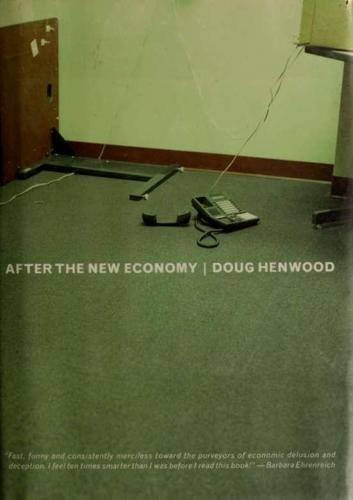
After the New Economy: The Binge . . . And the Hangover That Won't Go Away
by
Doug Henwood
Published 9 May 2005
For example, the FBI asked regulators to hold ofi^ on approving Deutsche Telekom's takeover of VoiceStream, the cellular telephone provider, while it could determine whether the deal would com-pHcate its ability to tap phone calls. While the Bureau's concerns didn't block the deal, it is a measure of how seriously federal agencies—often joined by members of Congress—take the matter of preserving U.S. security prerogatives in a supposedly borderless world. The U.S., of course, expresses no qualms when American telephone companies take over foreign companies; quite the contrary, opening up foreign telecoms markets is one of the most fervent passions of U.S. trade negotiators—mainly for commercial reasons, but the National Security Agency probably isn't displeased either.
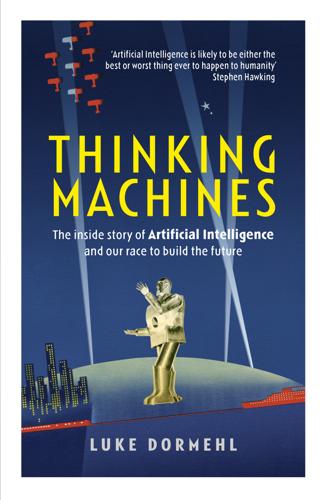
Thinking Machines: The Inside Story of Artificial Intelligence and Our Race to Build the Future
by
Luke Dormehl
Published 10 Aug 2016
In 1964, the same year as the New York World’s Fair, the British architect Ron Herron came up with his concept for a ‘Walking City’. Described in the avant-garde architecture journal Archigram, Herron argued for the construction of enormous, artificially intelligent mobile robotic platforms capable of roaming the Earth like giant skyscraper-carrying spiders. These walking cities would exist in borderless worlds in which they were free to go wherever they needed to acquire the necessary resources or manufacturing abilities. Herron’s cities would even, he explained, have the ability to connect with one another to create even larger ‘walking metropolises’. Not only would such cities be self-sufficient but, thanks to breakthroughs in AI, literally autonomous.
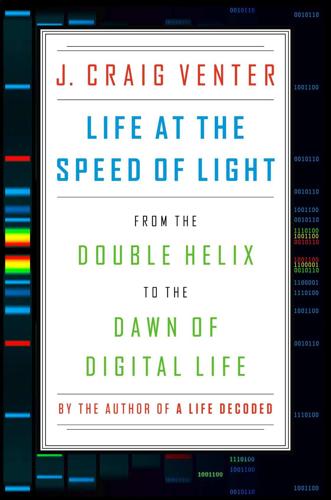
Life at the Speed of Light: From the Double Helix to the Dawn of Digital Life
by
J. Craig Venter
Published 16 Oct 2013
Whatever we end up calling these devices, I am confident that in coming years we will be able to convert digitized information into living cells that will become complex multicellular organisms or can be “printed” to form three-dimensional functioning tissues. The ability to print an organism remains some way off but will become a possibility soon enough. We are moving toward a borderless world in which electrons and electromagnetic waves will carry digitized information here, there, and everywhere. Borne upon those waves of information, life will move at the speed of light. 12 Life at the Speed of Light The changing of Bodies into Light, and Light into Bodies, is very conformable to the Course of Nature, which seems delighted with Transmutations.

The Fracture Zone: My Return to the Balkans
by
Simon Winchester
Published 16 Oct 2000
After all, across the rest of Europe, in the North and South and even in much of the once Marxist East, there were everywhere the signs that life was about becoming so very much less complicated. Frontiers were coming down all over Europe. The passport seemed every day less essential. The cry of “Papers!” or of “Documents, please!” became less and less frequently heard. The borderless world seemed a concept well on its way to being born, and at least in Europe itself, there was also the probability, almost a reality now, of that elegant device to be known as the single currency. But here in the Balkans, while elsewhere frontiers were coming down and currencies were becoming melded and melted down into one another, the very opposite was happening.
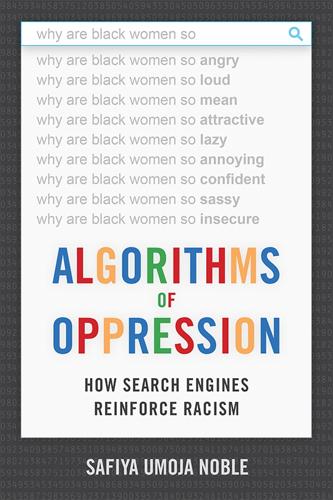
Algorithms of Oppression: How Search Engines Reinforce Racism
by
Safiya Umoja Noble
Published 8 Jan 2018
A Critical and Comprehensive Sociological Theory of Race and Racism. Sociology of Race and Ethnicity, 2(2), 129–141. doi:2332649216632242. Gold, D. (2011, November 10). The Man Who Makes Money Publishing Your Nude Pics. The Awl. Retrieved from www.theawl.com. Goldsmith, J. L., and Wu, T. (2006). Who Controls the Internet? Illusions of a Borderless World. New York: Oxford University Press. Goode, E. (2015, May 14). Open Letter to Google from 80 Internet Scholars: Release RTBF Compliance Data. Medium. Retrieved from www.medium.com/@ellgood. Google. (2012, August 10). An Update to Our Search Algorithms. Inside Search. Retrieved from http://search.googleblog.com.
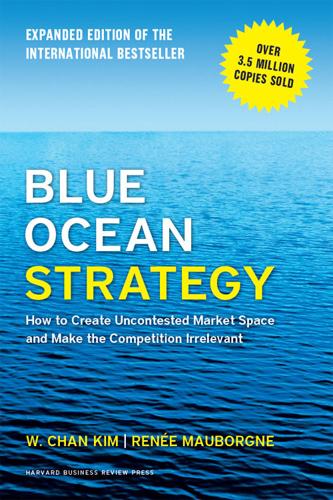
Blue Ocean Strategy, Expanded Edition: How to Create Uncontested Market Space and Make the Competition Irrelevant
by
W. Chan Kim
and
Renée A. Mauborgne
Published 20 Jan 2014
New York: Penguin Press Science. North American Industry Classification System: United States 1997. 1998. Lanham, VA: Bernan Press. Nova. 2003. “Battle of the X-Planes.” PBS. February 4. Ohmae, Kenichi. 1982. The Mind of the Strategist: The Art of Japanese Business. New York: McGraw-Hill. ———. 1990. The Borderless World: Power and Strategy in the Interlinked Economy. New York: HarperBusiness. ———. 1995a. End of the Nation State: The Rise of Regional Economies. New York: HarperCollins. Ohmae, Kenichi, ed. 1995b. The Evolving Global Economy: Making Sense of the New World Order. Boston: Harvard Business School Press.
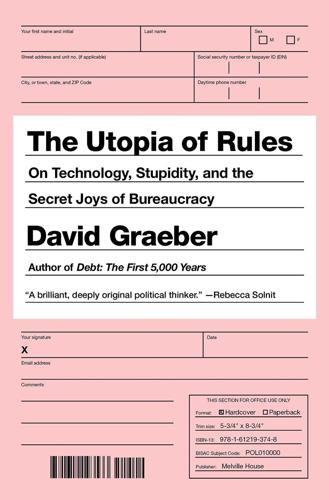
Bureaucracy
by
David Graeber
Published 3 Feb 2015
It was really about trapping increasingly large parts of the world’s population behind highly militarized national borders within which social protections could be systematically withdrawn, creating a pool of laborers so desperate that they would be willing to work for almost nothing. Against it, they proposed a genuinely borderless world. Obviously, these ideas’ exponents did not get to say any of this on TV or major newspapers—at least not in countries like America, whose media is strictly policed by its own internal corporate bureaucrats. Such arguments were, effectively, taboo. But we discovered that there was something we could do that worked almost as well.
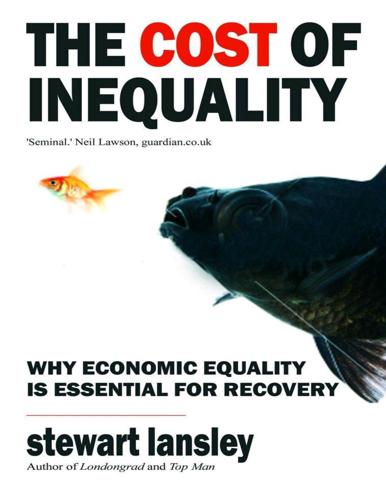
The Cost of Inequality: Why Economic Equality Is Essential for Recovery
by
Stewart Lansley
Published 19 Jan 2012
Not only have capital controls been abandoned, ‘we have now taken a full step again beyond that, into a world where capital is not only free to flow across borders, but is actively and artificially encouraged to move,’ writes Nicholas Shaxson in his study of the power of the offshore tax industry, ‘lured by any number of offshore attractions: secrecy, evasion of prudential banking regulations, zero taxes.’158 Soon international capitalism—‘financial liberalisation on steroids’, as Shaxson has described it159—was being driven by the demands of a tsunami of global footloose capital looking for the most lucrative home. In this new borderless world, money poured into the global financial centres, especially London and New York. From there it spiralled round the world often at speed creating wave after wave of hot money flows. The super-rich owners of this money might once have been more closely tied to their own nation, and had a genuine identification with the country where they were born and lived.
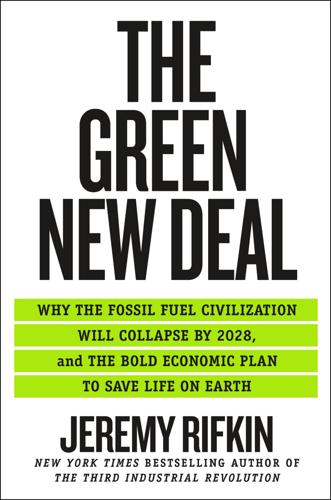
The Green New Deal: Why the Fossil Fuel Civilization Will Collapse by 2028, and the Bold Economic Plan to Save Life on Earth
by
Jeremy Rifkin
Published 9 Sep 2019
In the First Industrial Revolution in the nineteenth century, empathy extended to figurative families based on a collective sense of national loyalty to the Motherland or Fatherland. Citizens began to empathize with each other based on their nation-state identity. In the Second Industrial Revolution in the twentieth century, empathy extended to like-minded cosmopolitan and professional ties in an increasingly borderless world. In the emerging Third Industrial Revolution, a generation of digital natives Skyping in global classrooms, interacting on Facebook and Instagram, gaming in virtual worlds, and obsessively traveling the physical world are beginning to see themselves as a planetary cohort inhabiting a common biosphere.
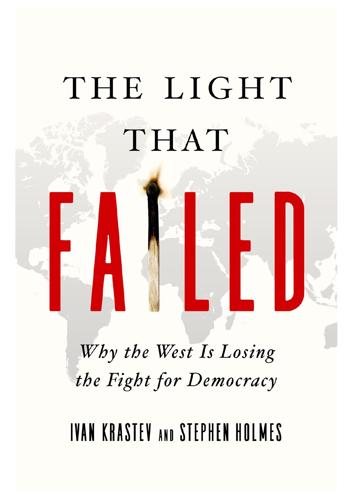
The Light That Failed: A Reckoning
by
Ivan Krastev
and
Stephen Holmes
Published 31 Oct 2019
According to Quebec University expert Elisabeth Vallet, almost a third of the world’s countries are rearing barriers along their borders.7 The three decades following 1989 turned out to be an ‘inter-mural period’, a brief barricade-free interval between the dramatic breaching of the Berlin Wall, exciting utopian fantasies of a borderless world, and a global craze of wall-building, with cement and barbed-wire barriers embodying existential (if sometimes imaginary) fears. Most Europeans and Americans today also believe that the lives of their children will be less prosperous and fulfilling than their own.8 Public faith in democracy is plummeting and long-established political parties are disintegrating or being crowded out by amorphous political movements and populist strongmen, putting into question the willingness of organized political forces to fight for democracy’s survival in times of crisis.9 Spooked by the phantom of large-scale migration, electorates in parts of Europe and America are increasingly drawn to xenophobic rhetoric, authoritarian leaders and militarized borders.
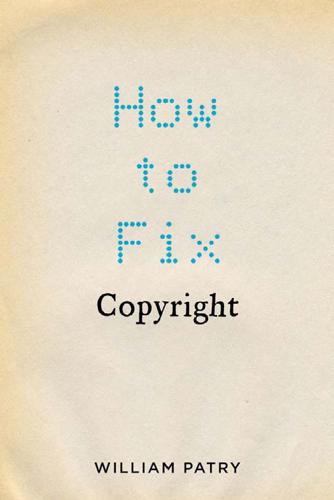
How to Fix Copyright
by
William Patry
Published 3 Jan 2012
This is pretty much the approach taken by Professor Ian Hargreaves in his report Digital Opportunity: A Review of Intellectual Property and Growth 45 (May 2011). 25. See http://en.wikipedia.org/wiki/A_Declaration_of_the_Independence_of_Cyberspace. Cf. Jack Goldsmith and Tim Wu, Who Controls the Internet?: Illusions of a Borderless World (2008, Oxford University Press. See also Johnny Ryan, A History of the Interent and the Digital Future (2010, Reaktion Books). 26. Francis Gurry,The Future of Copyright, address delivered in Sydney, Australia, February 25, 2011. 27. Joseph Schumpeter, Capitalism, Socialism and Democracy 83 (Harper & Brothers 3d ed. 1950, 2006 paperback) (1942). 28.
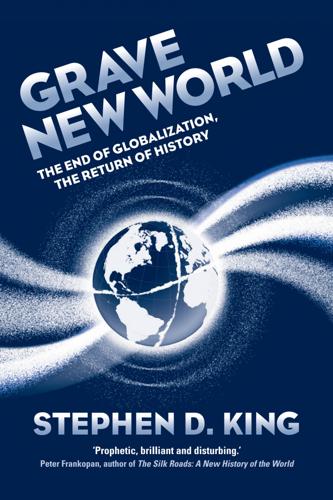
Grave New World: The End of Globalization, the Return of History
by
Stephen D. King
Published 22 May 2017
GOFF, however, has one very obvious drawback in a world in which globalization appears to be in retreat. It would be yet another international institution that, for many voters, would appear to be both technocratic and unaccountable. Would political leaders be prepared to support it? Would they dare? Can globalization only be saved by creating institutions that voters are already opposing? A BORDERLESS WORLD A third option would be to dispense with borders altogether. The nearest we have got to this is perhaps the European Union – or, more specifically, the 19 members that make up the Eurozone. Yet the single currency project is only half-finished – and arguably only half-baked. The Eurozone has some aspects of nationhood: a single currency, a single monetary policy, a single (although incomplete) market and, for those who also happen to be members of Schengen, a common external border.

Hiding in Plain Sight: The Invention of Donald Trump and the Erosion of America
by
Sarah Kendzior
Published 6 Apr 2020
The same features of online discourse that people in free states found liberating—the ability to join and leave a community at will, to write under multiple identities, to preserve and resurrect old arguments—made the internet perilous for participants whose default mode was distrust due to the long-standing oppression they had experienced. You could reinvent yourself on the internet, but you could not start over. In the early 2010s, most scholars of digital technology and politics emphasized the positive. They envisioned a borderless world in which citizens, buoyed by technology, could expose and thereby rectify structural problems. Their enthusiasm extended to social media corporations, which were often credited for a successful demonstration instead of the actual protesters. In the West, Iran’s 2009 uprising was deemed a “Twitter Revolution” and the Arab Spring was called a “Facebook Revolution.”
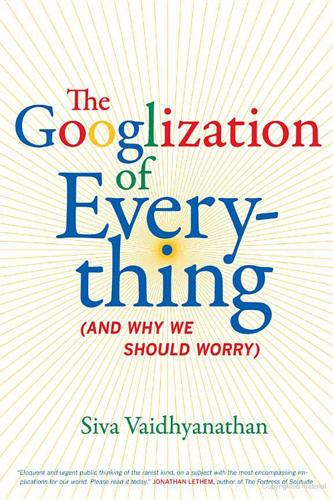
The Googlization of Everything:
by
Siva Vaidhyanathan
Published 1 Jan 2010
Johnny_mango, “ ‘Lost’ Police Incident Report . . . Is This What Heather Wilson ‘Lost’ 13 Years Ago?” Albloggerque, October 19, 2006, http:// albloggerque.blogspot.com; Vaidhyanathan, “What We Might Lose.” 48. Vaidhyanathan, “What We Might Lose.” 49. Jack Goldsmith and Tim Wu, Who Controls the Internet? Illusions of a Borderless World (New York: Oxford University Press, 2006). NOT ES TO PAGES 39–4 3 227 50. Abigail Cutler, “Penetrating the Great Firewall: Interview with James Fallows,” Atlantic, February 19, 2008; James Fallows, “ ‘The Connection Has Been Reset,’ ” Atlantic, March 2008; Ronald Deibert et al., Access Denied: The Practice and Policy of Global Internet Filtering (Cambridge, MA: MIT Press, 2008). 51.
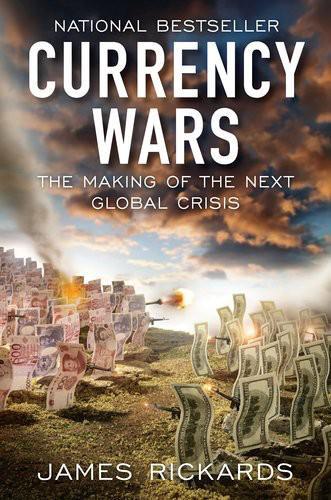
Currency Wars: The Making of the Next Gobal Crisis
by
James Rickards
Published 10 Nov 2011
Economic and political walls were coming down while, at the same time, technology facilitated ease of communication and improved productivity. From the point of view of finance, the world was now borderless and moving quickly toward what legendary banker Walter Wriston had presciently called the twilight of sovereignty. Infinite risk in a borderless world was the new condition of finance. Globalization increased the scale and interconnectedness of finance beyond what had ever existed. While issuance of bonds was traditionally limited by the use to which the borrower put the proceeds, derivatives had no such natural limit. They could be created in infinite amounts by mere reference to the underlying security on which they were based.
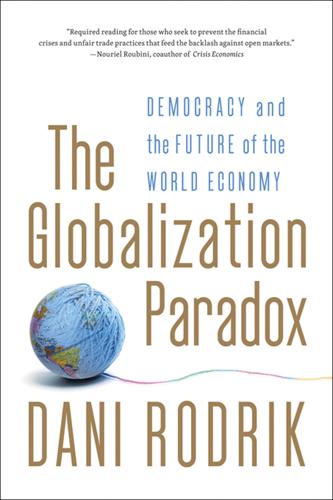
The Globalization Paradox: Democracy and the Future of the World Economy
by
Dani Rodrik
Published 23 Dec 2010
Instead of viewing it as a system that requires a single set of institutions or one principal economic superpower, we should accept it as a collection of diverse nations whose interactions are regulated by a thin layer of simple, transparent, and commonsense traffic rules. This vision will not construct a path toward a “flat” world—a borderless world economy. Nothing will. What it will do is enable a healthy, sustainable world economy that leaves room for democracies to determine their own futures. AFTERWORD A Bedtime Story for Grown-ups Once upon a time there was a little fishing village at the edge of a lake. The villagers were poor, living off the fish they caught and the clothing they sewed.
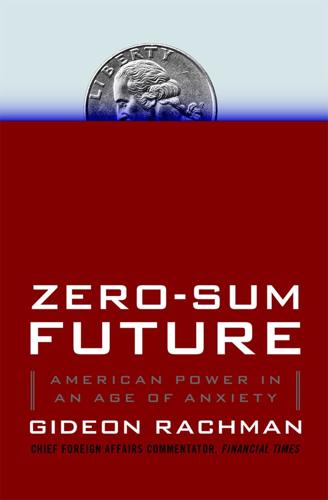
Zero-Sum Future: American Power in an Age of Anxiety
by
Gideon Rachman
Published 1 Feb 2011
That in turn had dramatically reduced the threat of another world war breaking out on the old continent. The technological euphoria of the Age of Optimism added an extra layer to the theory. The divided world of the cold war had given way to a unified global economy, tied together by high technology. The new technologies empowered individuals and broke down national boundaries. In a “borderless world,” the idea of nation-states going to war seemed positively antediluvian. In his second book on globalization, The World Is Flat, Friedman came up with another version of “democratic peace” theory to illustrate the argument. The “Dell theory of conflict prevention” argued that war between China and Taiwan was made much less likely (impossible, said Friedman) by the fact that they were part of the same high-tech supply chain that manufactured Dell computers.2 Friedman was skillfully popularizing ideas that had been part of liberal theory for many years.
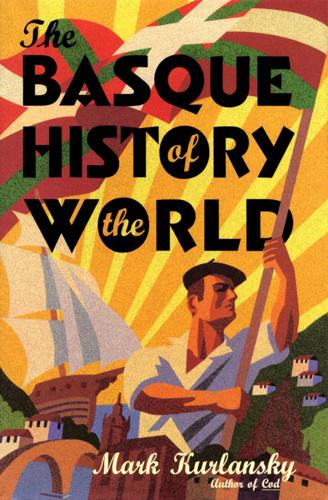
The Basque History of the World
by
Mark Kurlansky
Published 4 Jul 2010
At the dawn of capitalism they were among the first capitalists, experimenting with tariff-free international trade and the use of competitive pricing to break monopolies. Early in the industrial revolution they became leading industrialists: shipbuilders, steelmakers, and manufacturers. Today, in the global age, even while clinging to their ancient tribal identity, they are ready for a borderless world. WHEN CAPITALISM was new and New England traders were beginning to change the world, Boston enjoyed a flourishing trade with Bilbao. John Adams ascribed the prosperity of the Basques to their love of freedom. In 1794, he wrote of the Basques, “While their neighbors have long since resigned all their pretensions into the hands of Kings and priests, this extraordinary people have preserved their ancient language, genius, laws, government and manners, without innovation, longer than any other nation of Europe.”
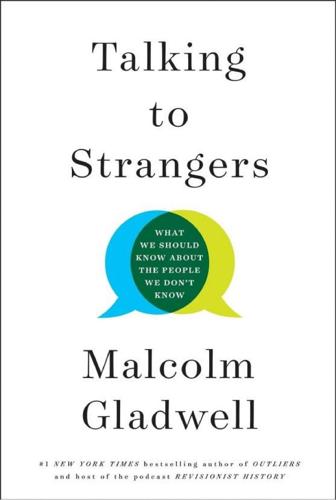
Talking to Strangers: What We Should Know About the People We Don't Know
by
Malcolm Gladwell
Published 9 Sep 2019
So it was that Brian Encinia ended up in a place he should never have been, stopping someone who should never have been stopped, drawing conclusions that should never have been drawn. The death of Sandra Bland is what happens when a society does not know how to talk to strangers. 6. This has been a book about a conundrum. We have no choice but to talk to strangers, especially in our modern, borderless world. We aren’t living in villages anymore. Police officers have to stop people they do not know. Intelligence officers have to deal with deception and uncertainty. Young people want to go to parties explicitly to meet strangers: that’s part of the thrill of romantic discovery. Yet at this most necessary of tasks we are inept.
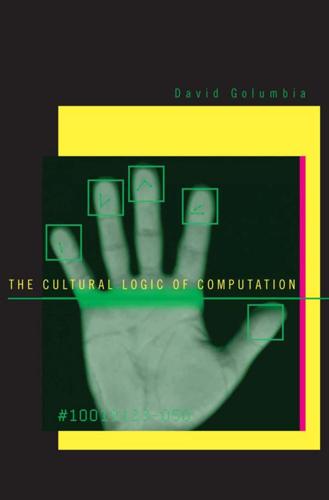
The Cultural Logic of Computation
by
David Golumbia
Published 31 Mar 2009
Gitelman, Lisa. 2006. Always Already New: Media, History, and the Data of Culture. Cambridge, MA: The MIT Press Gitelman, Lisa, and Geoffrey B. Pingree, eds. 2004. New Media, 1740–1915. Cambridge, MA: The MIT Press. Goldsmith, Jack, and Tim Wu. 2006. Who Controls the Internet? Illusions of a Borderless World. New York: Oxford University Press. Goldsmith, John. 2004. “From Algorithms to Generative Grammar and Back Again.” Paper delivered at Chicago Linguistics Society. Ms. University of Chicago. Golumbia, David. 1996a. “Black and White World: Race, Ideology, and Utopia in Triton and Star Trek.” Cultural Critique 32 (Winter), 75–96. ———. 1996b.
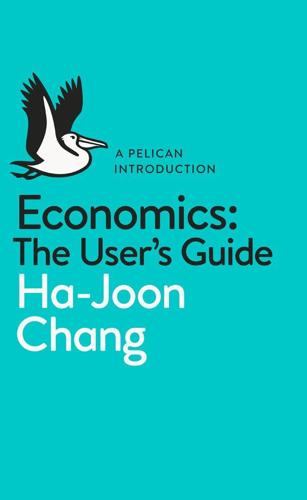
A Pelican Introduction Economics: A User's Guide
by
Ha-Joon Chang
Published 26 May 2014
According to the globalizers, countries now had no choice but to embrace this new reality and fully open up to international trade and investments, while liberalizing their domestic economies. Those who resisted this inevitability were derided as the ‘modern Luddites’, who think they can bring back a bygone world by reversing technological progress (see above). Book titles like The Borderless World, The World Is Flat and One World, Ready or Not summed up the essence of this new discourse. The beginning of the end: the Asian financial crisis The euphoria of the late 1980s and the early 1990s didn’t last. The first sign that not everything was fine with the ‘brave new world’ came with the financial crisis in Mexico in 1995.
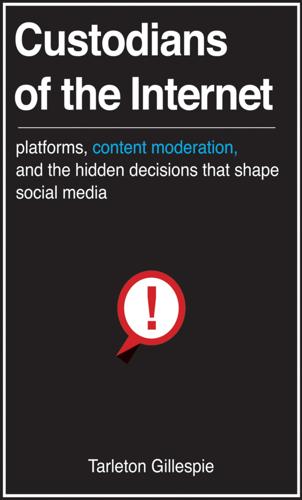
Custodians of the Internet: Platforms, Content Moderation, and the Hidden Decisions That Shape Social Media
by
Tarleton Gillespie
Published 25 Jun 2018
“Putting Cars on the ‘Information Superhighway’: Authors, Exploiters, and Copyright in Cyberspace.” Columbia Law Review 95 (6): 1466–99. GODWIN, MIKE. 2003. Cyber Rights: Defending Free Speech in the Digital Age. Rev. ed. Cambridge: MIT Press. GOLDSMITH, JACK, AND TIM WU. 2008. Who Controls the Internet? Illusions of a Borderless World. New York: Oxford University Press. GRAY, MARY L. 2009. Out in the Country: Youth, Media, and Queer Visibility in Rural America. New York: NYU Press. GRIMMELMANN, JAMES. 2014. “Speech Engines.” Minnesota Law Review 98 (3): 868–952. ———. 2015. “The Virtues of Moderation: Online Communities as Semicommons.”
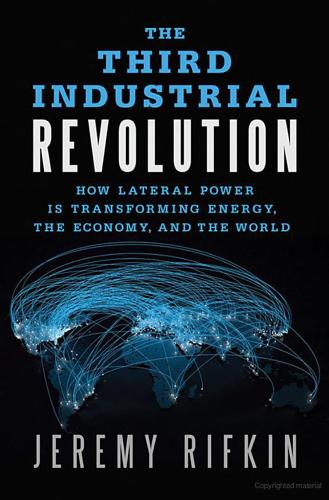
The Third Industrial Revolution: How Lateral Power Is Transforming Energy, the Economy, and the World
by
Jeremy Rifkin
Published 27 Sep 2011
The youth-led rebellion, symbolized by young Google executive Wael Ghonim, who became their “leaderless” spokesperson, used social media—Facebook, YouTube, and Twitter—to outflank and outmaneuver the state police and military, and eventually bring down one of the most dictatorial governments in the world. Youth-led street demonstrations using social media also broke out in Tunisia, Libya, Yemen, Jordan, Bahrain, and across the Arab region. The Internet generation is demanding an end to autocratic, centralized governance so they can live in an open, transparent, borderless world that reflects the operating norms and practices of the new social media that has come to define the aspirations of youth everywhere. The uproar among youth living in authoritarian countries will only grow more intense in the years ahead, as they demand their right to be part of a global family that is beginning to share knowledge, commerce, and social life across national boundaries.
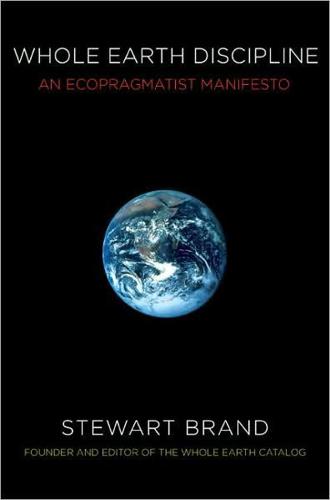
Whole Earth Discipline: An Ecopragmatist Manifesto
by
Stewart Brand
Published 15 Mar 2009
Collecting them all in one book is a tremendous public service. Where the Wild Things Were: Life, Death, and Ecological Wreckage in a Land of Vanishing Predators (2008), William Stolzenburg. A well-written and persuasive presentation of essential-predator theory. Life Out of Bounds: Bioinvasion in a Borderless World (1998), Chris Bright. This is the best survey I’ve seen on the impacts of alien-invasive species and what to do about them. The World Without Us (2007), Alan Weisman. Exceptionally thorough field research distinguishes this account of what life gets up to as soon as humans step away. It is a fascinating read.
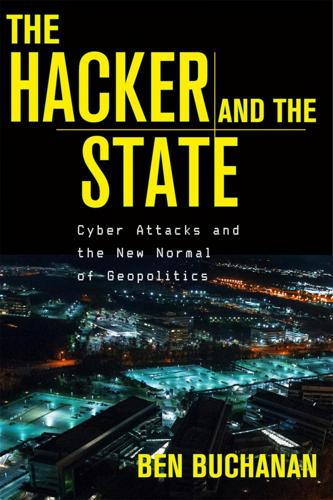
The Hacker and the State: Cyber Attacks and the New Normal of Geopolitics
by
Ben Buchanan
Published 25 Feb 2020
James Ball, Luke Harding, and Juliette Garside, “BT and Vodafone among Telecoms Companies Passing Details to GCHQ,” Guardian, August 2, 2013. Ryan Gallagher, “Vodafone-Linked Company Aided British Mass Surveillance,” The Intercept, November 20, 2014. 31. For an early view on this discussion, see Jack Goldsmith and Tim Wu, Who Controls the Internet? Illusions of a Borderless World (New York: Oxford University Press, 2006). 32. After Snowden’s revelations, the NSA said the threshold was not 51 percent, but offered no further information. “NSA’s Implementation of Foreign Intelligence Surveillance Act Section 702,” Office of Civil Liberties and Privacy, National Security Agency, April 16, 2014, 4; Rachel Martin, “Ex-NSA Head Hayden: Surveillance Balances Security, Privacy,” NPR, June 9, 2013. 33.
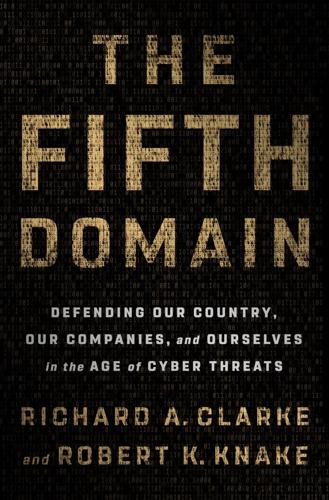
The Fifth Domain: Defending Our Country, Our Companies, and Ourselves in the Age of Cyber Threats
by
Richard A. Clarke
and
Robert K. Knake
Published 15 Jul 2019
as of the spring of 2019: Catalin Cimpanu, “Russia to disconnect from the internet as part of a planned test,” ZDNet, February 11, 2019, www.zdnet.com/article/russia-to-disconnect-from-the-internet-as-part-of-a-planned-test. When Yahoo told France: For an excellent discussion on this topic, see Tim Wu and Jack Goldsmith, Who Controls the Internet? Illusions of a Borderless World (New York: Oxford University Press, 2006). UN’s Group of Governmental Experts: Elaine Korzak, “UN GGE on Cybersecurity: The End of an Era?,” The Diplomat, July 31, 2017, https://thediplomat.com/2017/07/un-gge-on-cybersecurity-have-china-and-russia-just-made-cyberspace-less-safe. “offered the best chance for the UK”: Asa Bennett, “Did Britain really vote Brexit to cut immigration?
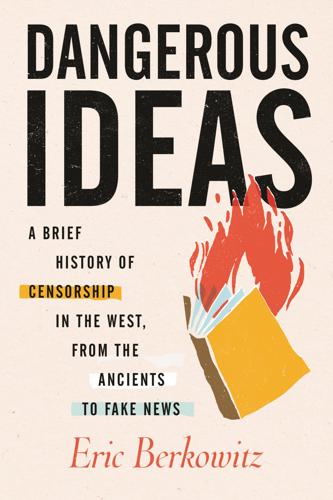
Dangerous Ideas: A Brief History of Censorship in the West, From the Ancients to Fake News
by
Eric Berkowitz
Published 3 May 2021
James Pearson, “Facebook Agreed to Censor Posts After Vietnam Slowed Traffic,” Reuters, April 21, 2020, https://www.reuters.com/article/us-vietnam-facebook-exclusive/exclusive-facebook-agreed-to-censor-posts-after-vietnam-slowed-traffic-sources-idUSKCN2232JX. 94. Jack Goldsmith and Tim Wu, Who Controls the Internet? Illusions of a Borderless World (New York: Oxford University Press, 2008), 10. 95. Kate Conger and Daisuke Wakabayashi, “Google Employees Protest Secret Work on Censored Search Engine for China,” New York Times, August 16, 2018, https://www.nytimes.com/2018/08/16/technology/google-employees-protest-search-censored-china.html; Ryan Gallagher, “Google Employees Uncover Ongoing Work on Censored China Search,” Intercept, March 4, 2019, https://theintercept.com/2019/03/04/google-ongoing-project-dragonfly. 96.
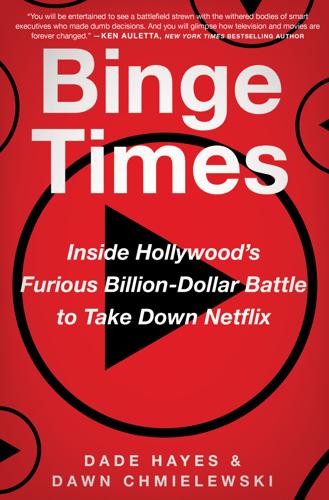
Binge Times: Inside Hollywood's Furious Billion-Dollar Battle to Take Down Netflix
by
Dade Hayes
and
Dawn Chmielewski
Published 18 Apr 2022
It green-lit an eclectic slate of original series, from the futuristic Altered Carbon, to the controversial teen suicide drama 13 Reasons Why, to a fourth season of the resurrected dysfunctional-family sitcom Arrested Development. As Netflix’s content flowed onto millions of screens around the world, it invested deeply in local-language production to attract subscribers from Darfur to Kuala Lumpur. Netflix discovered its shows effortlessly traveled the borderless world of the internet, propelled by local-language dubbing and its recommendation engine. The German time-travel series Dark, the postapocalyptic Danish series The Rain, India’s crime thriller Sacred Games, and France’s action mystery Lupin would find audiences well beyond their countries of origin.
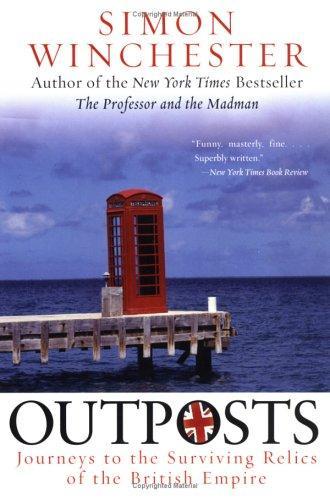
Outposts: Journeys to the Surviving Relics of the British Empire
by
Simon Winchester
Published 31 Dec 1985
Informal Empire is another—the notion that since the old, formal Empires are all now dead, since the systems of unelected Governors and Viceroys and District Commissioners have all passed away, what replaces them is an unstructured kind of imperium, with on the one hand a slew of new and similarly unelected rulers, which in this case are banks, corporations and brands, all operating without restriction in a new and economically borderless world, and on the other hand a vast and disparate body of subject peoples, who are in increasing numbers bound to make use of these banks, corporations and brands and are kept in thrall to them unwittingly, but firmly kept there nonetheless. The benefits of globalisation are proclaimed vociferously by the banks and corporations who are its prime beneficiaries: economies of scale mean that consumer products become cheaper and more widely available; bureaucracy crumbles in the face of corporate-directed efficiency; access to goods and services is more widespread, more democratic, the standard of living everywhere improves—everyone floats higher on an ever-rising tide of global prosperity.
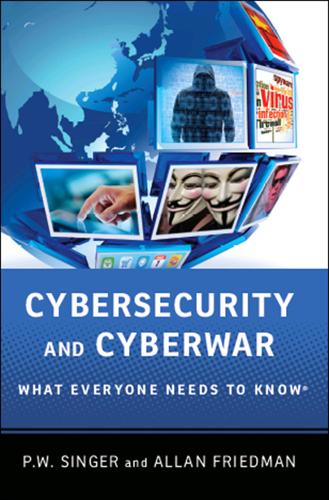
Cybersecurity: What Everyone Needs to Know
by
P. W. Singer
and
Allan Friedman
Published 3 Jan 2014
the system’s evolution Vint Cerf, “IETF and the Internet Society,” Internet Society, July 18, 1995, http://www.internetsociety.org/internet/what-internet/history-internet/ietf-and-internet-society. US government’s central involvement Jack Goldsmith and Tim Wu, Who Controls the Internet? Illusions of a Borderless World (New York: Oxford University Press, 2006). “diversity of the Internet” United States Department of Commerce, “State of Policy on the Management of Internet Names and Addresses,” National Telecommunications & Information Administration, June 5, 1998, http://www.ntia.doc.gov/federal-register-notice/1998/statement-policy-management-internet-names-and-addresses.
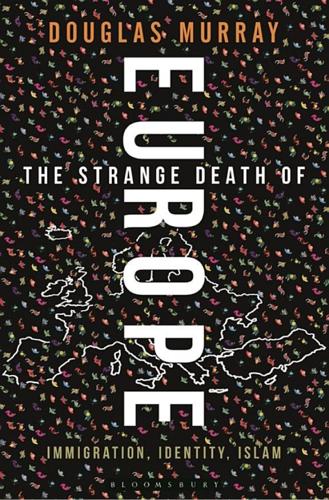
The Strange Death of Europe: Immigration, Identity, Islam
by
Douglas Murray
Published 3 May 2017
When it became known that a particular group were being put to the front of the asylum queue – Syrians, for instance – then a large number of people would claim to be Syrians, even though some of those working with the refugees noticed they were neither speaking any Syrian dialect nor knew anything about the country they claimed to be from. This phenomenon is at least partly caused by NGOs that advocate for any and all migration into Europe as part of the ‘borderless world’ movement. As the flow of migrants grew in the 2010s, some NGO groups decided to help migrants before they even got to Europe. They provided easily accessible information on the web and on phone apps to guide would-be Europeans through the process. This included advice on where to go and what to say once there.
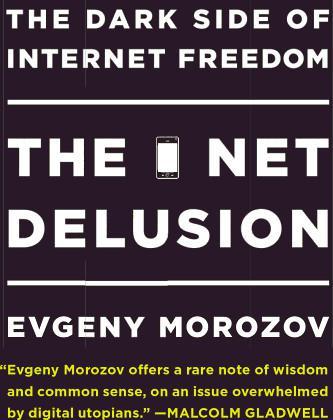
The Net Delusion: The Dark Side of Internet Freedom
by
Evgeny Morozov
Published 16 Nov 2010
“How to Help Iran’s Green Revolution.” Wall Street Journal, January 21, 2010. Glenny, Misha. “BlackBerry Is but a Skirmish in the Battle for the Web.” Financial Times, August 6, 2010. Goldsmith, Jack L., and Tim Wu. “Digital Borders.” Legal Affairs (2006): 40. ———. Who Controls the Internet?: Illusions of a Borderless World. New York: Oxford University Press, 2006. Gunaratne, S. A. “De-Westernizing Communication/Social Science Research: Opportunities and Limitations.” Media, Culture & Society 32, no. 3 (2010): 473. Guynn, Jessica. “Twitter Hires Obama Administration’s Katie Stanton.” Los Angeles Times, July 10, 2010.
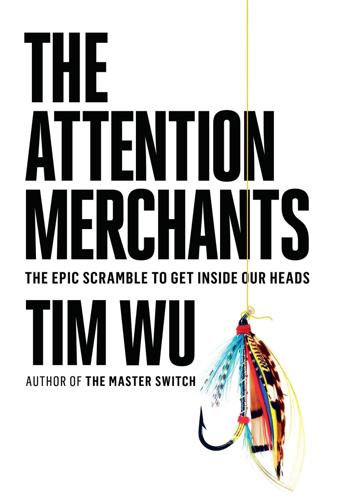
The Attention Merchants: The Epic Scramble to Get Inside Our Heads
by
Tim Wu
Published 14 May 2016
Henry Blodget, “The Maturation of the Billionaire Boy-Man,” New York, May 6, 2012; David Kirkpatrick, The Facebook Effect: The Inside Story of the Company That Is Connecting the World (New York: Simon & Schuster, 2010). 4. Jack Goldsmith and Tim Wu, Who Controls the Internet?: Illusions of a Borderless World (Oxford, UK: Oxford University Press, 2006), 17–18. 5. Erin E. Buckels et al., “Trolls Just Want to Have Fun,” Personality and Individual Differences 67 (2014), 1. 6. Max Chafkin, “How to Kill a Great Idea!,” accessed February 22, 2016, http://www.inc.com/magazine/20070601/features-how-to-kill-a-great-idea.html. 7.
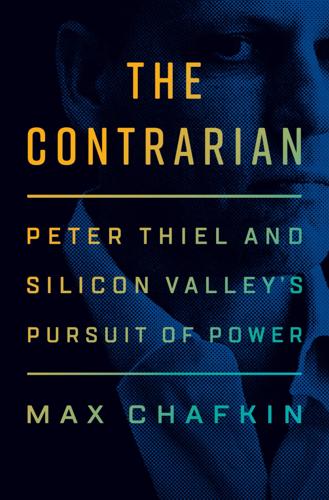
The Contrarian: Peter Thiel and Silicon Valley's Pursuit of Power
by
Max Chafkin
Published 14 Sep 2021
Zuckerberg had regarded Thiel warily almost from the beginning, and Thiel had never embraced the function or philosophy of Facebook, even if it was the most successful bet he’d made in his career. For a man who’d at times obsessed over the destructive power of imitation and competition, of wanting what others want; for a man who’d railed about the dangers of the increasingly borderless world; for a man who’d complained that the best and brightest of his generation were wasting their time on piddling software companies—what, exactly, was Facebook? It was a social network of two billion people, built on the premise of transcending national boundaries, in which users competed with one another to see whose duckface selfie, or bare feet pointed to the surf, or just-so breakfast would get the most Likes.
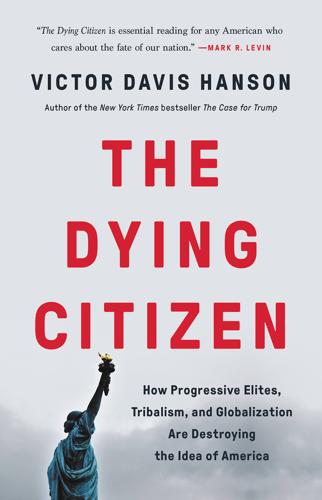
The Dying Citizen: How Progressive Elites, Tribalism, and Globalization Are Destroying the Idea of America
by
Victor Davis Hanson
Published 15 Nov 2021
They share a common history. Their sacred physical space allows them to pursue their constitutional rights without interference from abroad. Living on common and exclusive ground encourages shared values, assimilation, and integration and defines national character. Yet we now live in an increasingly borderless world, where the notion of anyone more blessed at birth than another is seen as unfair—as if, in an age of affordable and rapid travel, an accident of birth should not deprive any of the planet’s eight billion people from entering and living in the United States. Citizenship, however, is not indestructible.

Surveillance Valley: The Rise of the Military-Digital Complex
by
Yasha Levine
Published 6 Feb 2018
“I don’t think there could be any motivation other than greed for a company to deliberately keep secret how it collects and uses student information” (Benjamin Herold, “Mississippi Attorney General Sues Google over Student-Data Privacy,” Education Week, January 19, 2017). 131. Jack Goldsmith and Tim Wu, Who Controls the Internet? Illusions of a Borderless World (New York: Oxford University Press, 2006). 132. Mark Ames, “Team Omidyar, World Police: eBay Puts User Data on a Silver Platter for Law Enforcement,” Pando Daily, December 14, 2013, https://pando.com/2013/12/14/team-omidar-world-police-ebay-puts-user-data-on-a-silver-platter-for-law-enforcement/. 133.
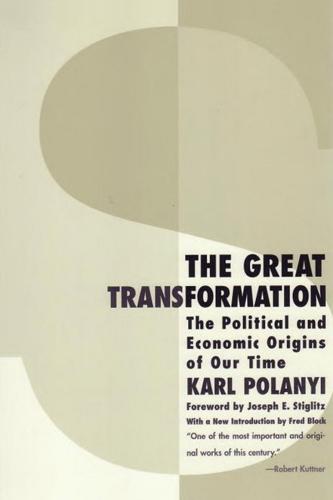
The Great Transformation: The Political and Economic Origins of Our Time
by
Karl Polanyi
Published 27 Mar 2001
The flow of resources from a lucrative colony might save the nation from a wrenching crisis caused by a sudden outflow of gold, and the exploitation of the overseas populations might help keep domestic class relations from becoming even more explosive. Polanyi argues that the utopianism of the market liberals led them to invent the gold standard as a mechanism that would bring a borderless world of growing prosperity. Instead, the relentless shocks of the gold standard forced nations to consolidate themselves around heightened national and then imperial boundaries. The gold standard continued to exert disciplinary pressure on nations, but its functioning was effectively undermined by the rise of various forms of protectionism, from tariff barriers to empires.
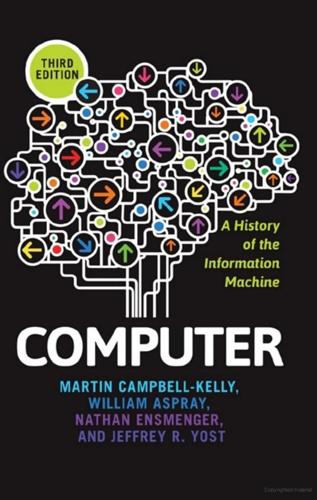
Computer: A History of the Information Machine
by
Martin Campbell-Kelly
and
Nathan Ensmenger
Published 29 Jul 2013
Gillies, James, and Robert Cailliau. 2000. How the Web Was Born: The Story of the World Wide Web. Oxford: Oxford University Press. Goldberg, Adele, ed. 1988. A History of Personal Workstations. New York: ACM Press. Goldsmith, Jack L., and Tim Wu. 2006. Who Controls the Internet? Illusions of a Borderless World. New York: Oxford University Press. Goldstein, Andrew, and William Aspray, eds. 1997. Facets: New Perspectives on the History of Semiconductors. New York: IEEE Press. Goldstine, Herman H. 1972. The Computer: From Pascal to von Neumann. Princeton: Princeton University Press. Gompers, Paul. 1994.
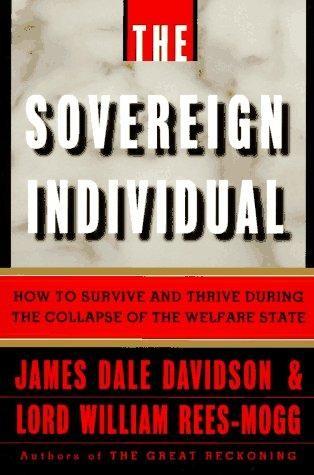
The Sovereign Individual: How to Survive and Thrive During the Collapse of the Welfare State
by
James Dale Davidson
and
William Rees-Mogg
Published 3 Feb 1997
In the words of Andrew Heal, they will "despise the entry of immigrants whose main entry criterion appears to be their wealth or their lack of it, which, the specious logic goes, makes them welfare burdens." 96 Fear of Freedom The prospect of the disappearance of the nationstate early in the new millennium seems timed to effect the maximum disruption in the lives of suggestible people. This 239 will lead to widespread unpleasantness. More than a few observers have recognized a pattern of reaction that is common among those who feel left out by the prospect of a borderless world. As the larger, more inclusive national grouping begins to break down, with the more mobile "information elite" globalizing their affairs, the "losers and leftbehinds" fall back upon membership in an ethnic subgroup, a tribe, a gang, a religious or linguistic minority. Partly, this is a practical and pragmatic reaction to the collapse of services, including law and order, formerly provided by the state.

Corporate Warriors: The Rise of the Privatized Military Industry
by
Peter Warren Singer
Published 1 Jan 2003
In fact, the advance that Osama bin Laden brought to terrorism was its privatization, essentially acting as a venture capitalist for terror cells at a time when state sponsorship dried up.14 These new conflict actors range from terrorist organizations like al Qaeda to transnational drug cartels. The increasingly borderless world system has played a part. It may help world trade flows, but its negative result is that conflicts are engendered by the ease of criminal economic transactions and new availability of illicit supplies. Many of the internal conflicts that have popped up since the Cold War are in fact criminally related assaults on state sovereignty by non-state actors (for example, in Colombia, Liberia, Sierra Leone, and Tajikistan).

Fancy Bear Goes Phishing: The Dark History of the Information Age, in Five Extraordinary Hacks
by
Scott J. Shapiro
subpoenas are confidential: Witnesses and prosecutors can waive the confidentiality requirement. devices in Alaska: Purdue CERIAS, “2020–04–08 CERIAS-Mirai-DDoS,” at 39:30. they served subpoenas on: Graff, “How a Dorm Room.” physical space: A point made fifteen years ago by Jack Goldsmith and Tim Wu, Who Controls the Internet: Illusions of a Borderless World (New York: Oxford University Press, 2008). “I’ve run against”: Graff, “How a Dorm Room.” raided the boy’s house: Graff, “How a Dorm Room.” 350 gigabits/second: Brian Krebs, “Who Is Anna-Senpai, the Mirai Worm Author?,” Krebs on Security, January 18, 2017, krebsonsecurity.com/2017/01/who-is-anna-senpai-the-mirai-worm-author.
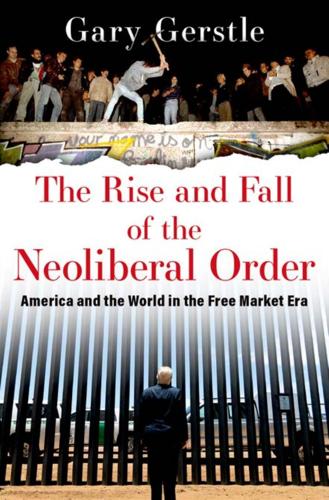
The Rise and Fall of the Neoliberal Order: America and the World in the Free Market Era
by
Gary Gerstle
Published 14 Oct 2022
As this belief lost influence, so did the order that it had done so much to bring into being. “Protectionism” had been a dirty word of political economy for thirty years. It no longer was, not for Republicans and not for Democrats. Producers and consumers in various countries had begun to question the pursuit of a borderless world. Trump was one of many politicians around the globe who were rising to power by amplifying these doubts and by promising a protectionist future. Part of Trump’s pitch was that free trade had benefited only the “globalists.” In an ad released in the final days of the 2016 presidential campaign, Trump had proclaimed that “a global power structure” had “robbed our working class, stripped our country of its wealth, and put that money into the pockets of a handful of large corporations and political entities.”15 Trump promised that his presidency would upend that power structure and substitute for it one that benefited ordinary Americans.
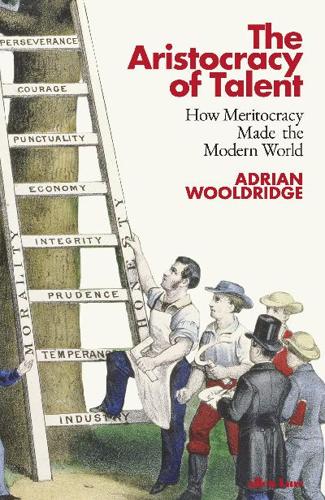
The Aristocracy of Talent: How Meritocracy Made the Modern World
by
Adrian Wooldridge
Published 2 Jun 2021
During the golden age of globalization from 1980 to the global financial crisis, leading companies embraced globalization with wide-eyed enthusiasm, first by establishing subsidiaries in lots of countries, then by trying to manage themselves as integrated operations. Most continue to embrace it today, although more nervously. Many of the prophets of globalization believed that global competition would lead to the ‘demise of size’ as small companies learned how to take advantage of a borderless world. In fact, the opposite has happened: the biggest global companies have consolidated their hold over the world economy. An annual list of the world’s top multinationals produced by the United Nations Conference on Trade and Development (UNCTAD) shows that, judged by measures such as sales and employment, such companies have all become substantially bigger since the mid-1990s.
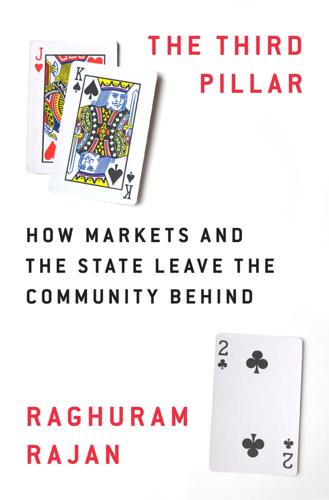
The Third Pillar: How Markets and the State Leave the Community Behind
by
Raghuram Rajan
Published 26 Feb 2019
By only allowing people in who share something common, such as values or ethnicity, they allow for collective national efforts and engender the mutual empathy that allows the country to create support structures such as public schools, safety nets, and disaster relief. Therefore, while borders get in the way of productive efficiency, they may be necessary for the structures that help citizens manage modern life. It would be nice to go toward one borderless world—where we feel empathy for one another as citizens of the world, even while celebrating our specific cultural traditions—and some of what I suggest later will be small steps in that direction. But we are not ready for it yet. Whether the lottery of birth that distributes citizenship is a fair one is a debate we will leave for global ethicists, and we will not enter the question of whether citizenship should be a right for those who have paid their dues—such as fighting in wars—or a gift to be bestowed by the citizenry who obtained their rights merely by birth.

Aerotropolis
by
John D. Kasarda
and
Greg Lindsay
Published 2 Jan 2009
New York: Cambridge University Press, 1980. Frock, Roger. Changing How the World Does Business: FedEx’s Incredible Journey to Success—the Inside Story. San Francisco: Berrett-Koehler, 2006. Fung, Victor K., William K. Fung, and Yoram (Jerry) Wind. Competing in a Flat World: Building Enterprises for a Borderless World. Upper Saddle River, NJ: Wharton School Pub., 2008. Gans, Herbert J. People and Plans: Essays on Urban Problems and Solutions. New York: Basic Books, 1968. Garreau, Joel. Edge City: Life on the New Frontier. New York: Anchor Books, 1992. Gilbert, Richard, and Anthony Perl. Transport Revolutions: Moving People and Freight Without Oil.
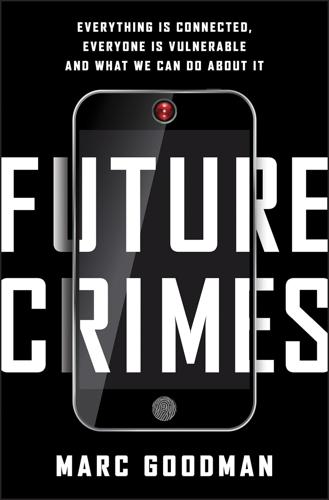
Future Crimes: Everything Is Connected, Everyone Is Vulnerable and What We Can Do About It
by
Marc Goodman
Published 24 Feb 2015
Importantly, he never needed to physically carry the thousands of pounds of cash out of the bank; it was all accomplished with a mouse and a keyboard. No need for a mask or sawed-off shotgun either; Levin merely hid behind his computer screen and used a circuitous virtual route to cover his digital tracks. The nature of the Internet means that we are increasingly living in a borderless world. Today anybody, with good or ill intent, can virtually travel at the speed of light halfway around the planet. For criminals, this technology has been a boon, as they hop from one country to the next virtually hacking their way across the globe in an effort to frustrate police. Criminals have also learned how to protect themselves from being tracked online.
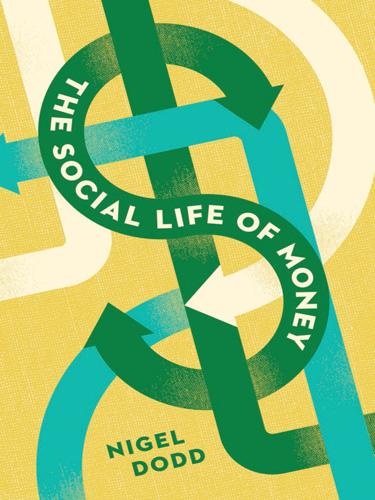
The Social Life of Money
by
Nigel Dodd
Published 14 May 2014
O’Brien, R. (1992). Global Financial Regulation: The End of Geography, New York, Council on Foreign Relations. O’Rourke, K. (2011). “A Summit to the Death.” Project Syndicate, December 9. http://www.project-syndicate.org/commentary/a-summit-to-the-death, accessed March 29, 2014. Ohmae, K. (1990). The Borderless World, New York, Harper Collins. Orhangazi, Ö. (2008). Financialization and the US Economy, Cheltenham, U.K., Edward Elgar Publishing. Orléan, A. (2013). “Money: Instrument of Exchange or Social Institution of Value?” Financial Crises and the Nature of Money: Mutual Developments from the Work of Geoffrey Ingham, J.
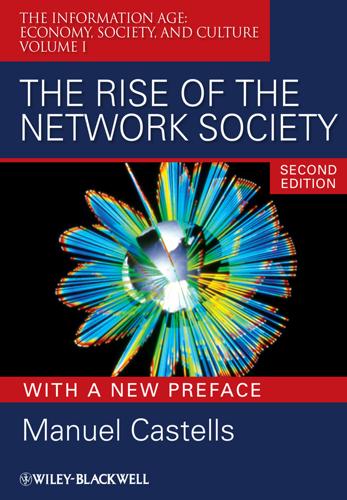
The Rise of the Network Society
by
Manuel Castells
Published 31 Aug 1996
Office of Technology Assessment (OTA) (US Congress) (1984) Computerized Manufacturing Automation: Employment, Education, and the Workplace, Washington, DC: US Government Printing Office. —— (1986) Technology and Structural Unemployment, Washington, DC: US Government Printing Office. Ohmae, Kenichi (1990) The Borderless World: Power and Strategy in the Interlinked Economy, New York: Harper. Osterman, Paul (1999) Securing Prosperity. The American Labor Market: How it has Changed and What to do About it, Princeton, NJ: Princeton University Press. Owen, Bruce M. (1999) The Internet Challenge to Television, Cambridge, MA: Harvard University Press.
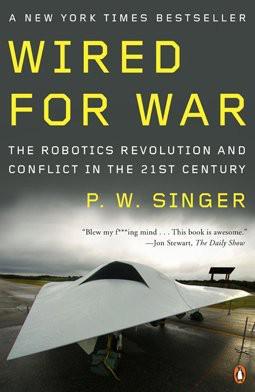
Wired for War: The Robotics Revolution and Conflict in the 21st Century
by
P. W. Singer
Published 1 Jan 2010
Experts sometimes talk about the “digital divide,” that certain information technologies like the Internet are not being spread around the globe at equal rates. The real divide may instead come from its solution: the more people are connected, the more what separates us becomes visible. The same holds for the cliché of the “borderless world.” Our global economy depends on a free-flowing system of trade, travel, and communication, but it also binds us all together to our greater danger. An outbreak of war or disease in one part of the globe reverberates across the system as never before. Even more, the shared networks give our new century’s warriors and warlords a newfound ability to reach out and touch someone.
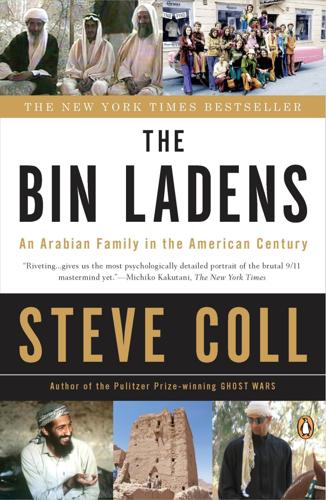
The Bin Ladens: An Arabian Family in the American Century
by
Steve Coll
Published 29 Mar 2009
Their father, Mohamed, the gifted architect of the family’s original fortune, migrated from a mud-rock fortress town in a narrow canyon in the remote Hadhramawt region of Yemen. He belonged to a self-confident people who were themselves pioneers of globalization, albeit in a slower-paced era of sailing ships and colonial power. Mohamed Bin Laden bequeathed to his children not just wealth, but a transforming vision of ambition and religious faith in a borderless world. PART ONE PATRIARCHS 1900 to September 1967 1. IN EXILE THE TROUBLE STARTED when an ox died. The ox belonged to Awadh Aboud Bin Laden. Around the turn of the twentieth century, he lived in the desert village of Gharn Bashireih, in a deep canyon called Wadi Rakiyah. The gorge cut a path of fifty miles through a region of southern Arabia, in modern Yemen, called the Hadhramawt, which means “Death Is Among Us.”
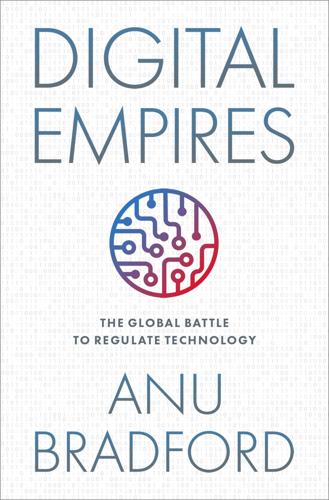
Digital Empires: The Global Battle to Regulate Technology
by
Anu Bradford
Published 25 Sep 2023
Rev. 1598, 1654 (2018). 61.See Ian Bremmer, The Technopolar Moment: How Digital Powers Will Reshape the Global Order, 100 Foreign Aff. 112–128 (2021). 62.See Stephen M. Walt, Big Tech Won’t Remake the Global Order, Foreign Pol’y (Nov. 8, 2021), https://foreignpolicy.com/2021/11/08/big-tech-wont-remake-the-global-order/. 63.See Jack Goldsmith & Tim Wu, Who Controls the Internet? Illusions of a Borderless World 65–85 (2006). 64.See, e.g., David R. Johnson & David Post, Law and Borders: The Rise of Law in Cyberspace, 48 Stan. L. Rev. 1367 (1996). 65.See, e.g., Goldsmith & Wu, supra note 63. 66.See Commission Regulation 2022/1925, of the European Parliament and of the Council of 14 September 2022 on Contestable and Fair Markets in the Digital Sector and Amending Directives 2019/1937 and 2020/1828 (Digital Markets Act), 2022 O.J.
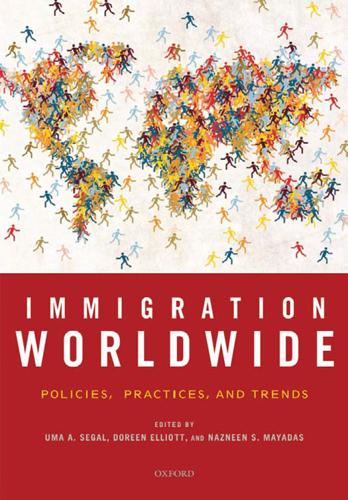
Immigration worldwide: policies, practices, and trends
by
Uma Anand Segal
,
Doreen Elliott
and
Nazneen S. Mayadas
Published 19 Jan 2010
Culture of Peace and Migration: Integrating Migration Education into Secondary School Social Science Curriculum in Thailand. Asian Research Center for Migration, Institute of Asian Studies: Chulalongkorn University. Chantavanich, S. (2003b). Human Security Issues on Migration. In Wan’gaeo, S. (Ed.), Challenges to Human Security in a Borderless World (p. 89– 150). Bangkok, Thailand. Chantavanich, S., et al. (2007). Mitigating Exploitative Situations of Migrant Workers in Thailand. The Asian Research Center for Migration, Institute of Asian Studies: Chulalongkorn University. Chantavanich, S., Beesey, A., Amaraphibal, A., Suwannachot, P.,Wangsiripaisal, P., & Paul, S. (2000a).